11/2024


11/2024

- Leadership in action - Focus on career development - Growth opportunities ahead

In the unfortunate event of an incident, having reliable people by your side can make all the difference in a speedy recovery and minimising disruption. That is where dot2dot comes in. We offer assistance to ensure you stay informed, access to expert guidance and support, ensuring you remain in control of your business.
Our extensive network of partners includes specialist safeguarding solicitors, crisis communication support, and a regulatory legal team. They are available to provide help and guidance on various subjects.
We understand emergencies can happen at any time,
which is why we offer out of hours support and even a counselling line to assist you and your team with whatever challenges arise. Talk to the team today call 01204 570 390



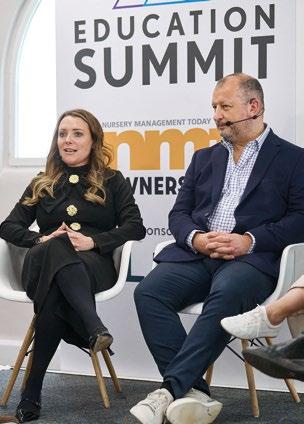

In this leadership series we hear from the team at Bright
Jenny Hyde shares advice on how to maintain complete transparency with your advisors
Justin Deaville, managing director of digital agency
Receptional, shares the latest research on what parents are looking for
Andrew K Steen reflects upon the year so far and the current state of the early years property landscape
Purnima Tanuku explores the NDNA’s Blueprint for Early Education and Care
Introducing CheckMate: An easy-to-use app which manages all of your kitchen based food safety checks.
Claudio Sisera explains how to create gender inclusive recruitment strategies
Scott Hutchinson reflects on some of the key issues facing nursery operators and explores how responsible finance can help unlock opportunities for growth
Angelica Celinska explores how to get more attention on the early years sector and burst out of the bubble
Take a read about what went on during our latest Education Summit and the discussions that were had
We have rounded up the top news about nursery managers across the country

The role of nursery manager is highly rewarding, but there may come a time when managers want to progress their career further within early years
Charlotte Goddard finds out about new resources aimed at supporting nurseries to incorporate sustainability into their curriculum and practice
In our series showcasing the sector’s nursery managers, we find out about Suzanne Charlesworth, nursery operations director at Kamelia Kids Day Nursery & Beach School
Charlotte Goddard finds out about a new resource helps upskill your team to engage in reflective practice and action research
Lucy Lewin explains why the language used by the inspectorate matters, while Ofsted’s Jayne Coward out the changes the inspectorate is making in response to sector concerns
























As I sit down to write this, I’m filled with a mix of nostalgia and gratitude. After five fascinating years as editor of NMT, it’s time for me to say goodbye.
Over the years, we’ve explored challenges, celebrated triumphs, and sparked important conversations. Your voices have enriched our content and have served as a constant reminder of the power that narrative holds.
It’s been wonderful to be a part of this community and the relationships I have built have been the highlight of my time here, but I know we will keep crossing paths. However, the editorship will be in brilliant hands with Charlotte Goddard and the rest of the team, and I can’t wait to see what NMT does next. I want to thank the entire team for their support and all the opportunities they have given me. There are so many skills I have gained and many lessons I will take forward. I want to especially thank Caroline who, from my very first day, mentored me in everything I could possibly need to know about the sector and introduced me to so many inspirational people who became, not just advisors, but friends. Thank you!
The dedication of those in the early years education sector is truly remarkable. Each day, you go above and beyond to create nurturing environments that support not only the children in your care but also their parents and the broader community. Your tireless efforts ensure that children receive the best possible start in life, while also providing vital resources and support to families navigating the challenges of early parenthood. It’s this commitment that strengthens our
communities and lays the foundation for a brighter future for all.
Looking ahead, it’s clear we must continue to advocate collectively for better pay and recognition for the early years’ workforce. The progress towards enhancing the sustainability of the sector must include seriously valuing the individuals who deliver it, and this fight continues. I really am in awe of the unwavering commitment there is to deliver high-quality education, despite the challenges. Thank you for all your guidance over the years. It has been insightful, fun and eye-opening. I couldn’t have done this role without your support so thank you!
Change always brings about new opportunities, and I have no doubt that there are exciting ones ahead for the sector. Keep innovating, keep your voices heard, and keep in touch. It has been a privilege.
Cheers

Briony Richter Editor, Nursery Management Today briony.richter@nexusgroup.co.uk

Ofsted released a report that analysed progress for pre-school aged children across four specific areas of learning: literacy, mathematics, understanding of the world, and expressive arts and design.
This is the inspectorate’s final part of its ‘Best start in life part 3: the 4 specific areas of learning’, research. It highlights how the “areas of learning give breadth and richness to the early years curriculum.”
Ofsted stated: “Teaching in the specific areas should… offer children opportunities to develop their executive function skills, which are one of the best predictors of a child’s later success.”
According to the inspectorate, key indicators of an effective early years education include:
• Interactions between children and adults that are high-quality, including both caring interactions and those promoting children’s thinking.
• Carefully considering what we teach our youngest children so that adults can make the best use of available time.
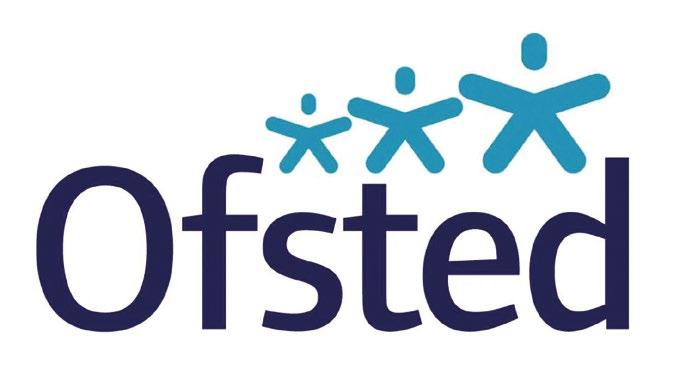
Busy Bees has launched a new curriculum focused on early years development. The programme has been created by Gill Jones, Busy Bees’ group chief quality officer and former Ofsted inspector. It also has contributions from experts in all aspects of early years education.
Developed in line with the latest child behavioural science research, the Bee Curious curriculum is designed to build on the Early Years Foundation Stage Framework to provide children with a set of broader, deeper and richer learning opportunities that will give them a

• Helping children learn new things by making links with things that they already know.
• Setting out activities that children might experience is not enough. Practitioners must ensure that learning is not left to chance and that all children have the support and guidance they need.
Purnima Tanuku, chief executive of National Day Nurseries Association, said: “This detailed report aligns with so many other pieces of research about
the importance of supporting children’s lifelong learning through high-quality early education and care.
“Focusing on key areas like communication, maths, creativity and personal, social and emotional development, this report underlines what we know is vital for our youngest children. It is the knowledge, skill, experience and care of the practitioners around them which gives children the best start in life.”
stronger foundation for future learning.
The curriculum incorporates a sequenced progression model which means that practitioners will make sure a child understands and is secure in each stage of learning before progressing to the next. This focus on ensuring a solid understanding at each stage of learning will enable children to build key skills and knowledge throughout their formative years.
The curriculum has been created around core themes such as vocabulary, developing a love of stories, and
understanding basic mathematical concepts – which are proven to support better outcomes in life.
Activities within the curriculum reflect the broad range of skills and knowledge children need to get off to a great start in life, from improving concentration through knowledge-based activities to building an appreciation for selfexpression through the arts, with a view to giving children a head start for school and setting them up for long-term success.
Gill Jones, group chief quality officer at Busy Bees said: “Thanks to the
guidance of industry-leading experts on child behaviour and development, and insight from scientific research, as well as our global network of practitioners, the Bee Curious curriculum combines a wealth of knowledge to encourage playbased learning that taps into the natural curiosity of our children.”
iStep Learning’s Southwater Day Nursery and Pre-school in West Sussex has completed an expansion project, increasing its capacity and enhancing its facilities. The expansion reflects rising demand for high-quality early years education and childcare in the area.
Nursery manager Sallyanne Kasey said: “This expansion is a testament to our commitment to providing exceptional care and early education. Our enhanced environment is equipped with the latest resources to support a broad range of learning and development opportunities for the children in our care.”
Dianne Lumsden-Earle, chief childcare and operations officer, added: “At iStep Learning, we are constantly striving to innovate and improve our settings. The expansion of Southwater Day Nursery and Pre-school is a key development in our mission to deliver outstanding childcare across all our nurseries.”
Utsaha Education, the owner of Southwest London day nursery Barnes Day Care, has secured a £2.5 million commercial mortgage refinance to help spur the growth of the business. The

move will free up cash the company plans to invest back into its child daycare services, and potentially future nursery acquisitions.
Having identified a significant undersupply of childcare, Utsaha Education was set up in 2022 with Barnes Day Care as its first project. Funded by Allica Bank, the commercial mortgage refinance will allow Utsaha to reduce the size of its debt repayments, which it can then invest back into services, such as exploring the further use of technology to aid child development or boosting service efficiencies. It is
The London Institute of Early Years is offering continued professional development (CPD) and training opportunities to professionals throughout the early years sector.
Focused on ensuring the best outcomes for children, the Institute’s courses are led by seasoned in-house trainers with practical nursery experience. The flexible format accommodates busy nursery schedules, helping learners balance work with their professional development.
Located within the London Early Years Foundation (LEYF), which operates 40 nurseries across the city, the Institute is open to both external learners and LEYF employees, with no membership necessary. Its mission is to promote best practices, encourage innovation, and share cutting-edge research, contributing to significant advancements in the early years sector.
The Institute offers training across all levels, from apprenticeships to CPD
also exploring other potential nursery acquisitions, having purchased Tiggers Nursery in Putney last year.
Andrew Pitayanukul, managing director at Utsaha Education, said: “Barnes Day Care has been an important part of this community for many years and we’ve loved every minute of being part of it since we took over in 2022. Our nursery management team do a fantastic job day-in, day-out, and this refinance will allow us to continue to invest in enhancing our child and parent services even further.”
and an early years degree accredited by the University of Wolverhampton. The Institute also provides specialist qualifications, including the CACHEaccredited early years chef qualification – the first of its kind – and the Level 4 sustainability accreditation in the early years.
The Institute also provides consultancy, research, bespoke training, and good practice guides, beginning with a ‘Prison Pack’. This is designed to support early
years professionals caring for children of parents in prison, and is soon to be followed by the ‘Twoness of Twos’ research which will offer a way of engaging parents to better understand and support their two-year-olds at home.■
“Its mission is to promote best practices, encourage innovation, and share cutting-edge research.”







Nearly 10% of the Bright Horizons UK workforce is completing an apprenticeship. By the end of this year, Bright Horizons will have recruited more than 300 external apprentices and ensured over 300 of their current employees have had the opportunity to upskill through an apprenticeship programme.
Bright Horizons has been supporting the evolving needs of working families for more than 35 years. At approximately 300 community and workplace nurseries across the UK, its caring and experienced teams create inspiring learning experiences that encourage children to be curious and confident.
James Sharrod, pathways manager at Bright Horizons, explains: “The majority of our apprenticeships are in early years. We offer other options, but the business has played into where the needs are. Entry points are rolling throughout the year and are not necessarily aligned to the end of the academic year or the start of a new one. There are approximately 50 new starters each month. We welcome and encourage apprentices of all ages.”
“Some join the profession later in life as a second career because an apprenticeship is a great way for people to be able to do that. It’s a great way to bring people in but also to provide a development pathway for existing colleagues.”
“Some join the profession later in life as a second career because an apprenticeship is a great way for people to be able to do that. It’s a great way to bring people in but also to provide a development pathway for existing colleagues.”

Sharrod continues: “Our exceptional training programmes go beyond traditional approaches, creating a vibrant learning culture that nurtures growth, innovation and leadership across every level of the organisation. Our professional development team joins each individual on their unique journey. We utilise a strategic blend of classroom settings, online platforms and e-learning modules to accommodate various learning styles. Our collaboration with esteemed bodies like the CPD Certification Service and ILM Assured Coaching ensures our offerings exceed industry benchmarks, instilling confidence in our colleagues and stakeholders.”
Inclusivity is central to the Bright Horizons culture, with measures in place to make learning accessible to all. The company uses narration, text-to-speech
scripts, and design practices tailored for neurodiverse learners, creating an environment where everyone feels valued and empowered.
Bright Horizons is now listed as one of the UK’s top five ‘Best Workplaces in Education & Training’. a recognition from the Great Place to Work organisation.
A home-grown nurture approach
The apprenticeship provision at Bright Horizons currently supports more than 600 learners, contributing to the growth of the early childhood sector. In conjunction, the Bright Horizons graduate programme offers skilled graduates a pathway into the early childhood sector, while its ‘Bright Bursts’ (short training modules) and dedicated fast-track programmes provide tailored support at every stage of a career journey. Career coaching is also offered to all employees.
Bright Horizons states that its approach

“Having a qualified pipeline of employees is imperative to a business in which ratios of adults to young children are a legislative necessity.”
is unique because of its full focus on nurturing. Sharrod explains: “Our nurture approach is research-based and unique to Bright Horizons. It guides our distinctive way of being with, teaching, and caring for young children. This creates the conditions for children to thrive by recognising that emotional wellbeing and security provides the foundations for learning and
development. In turn, opportunities to learn and develop are critical contributors to confidence, self-esteem, critical thought and emotional growth. This provides a holistic approach to early years care and education.”
“Having a qualified pipeline of employees is imperative to a business in which ratios of adults to young children are a legislative necessity. Because we pride ourselves on providing quality care to young children, being able to do it with home-grown colleagues is even more of a bonus. Our apprenticeship scheme, alongside our internal development programmes, now gives us a route to provide unqualified individuals with a development pathway up to director level. That’s something we’re really keen on.”
An award-winning apprentice
This year, Bright Horizons announced that Mohamed Elmi, from its Cedar
House Day Nursery and Preschool in Enfield, North London had been named ‘Early years apprentice of the year’ at the Nursery World Awards. Mohamed trusted Bright Horizons to nurture his passion for children, and he has since become an inspiration to his children and the community.
“We’re incredibly proud of Mohamed’s achievement,” says Janine Leightley, director of human resources at Bright Horizons. This award is foremost a celebration of his excellence. Mohamed’s success is also a shining example of how men in early years make a difference. Bright Horizons is always looking to support bright and motivated men to embark on a career that has the power to change childhoods.”
Elmi says: “When I was initially approached to work in early years from an agency back in 2021, my family were a little surprised as this is not normal

for someone of my background to go into. But over the last few years, they’ve loved seeing me work in early years. In my culture, they see early years jobs as just involving women, but I wanted to change that and join the other male colleagues who are looking to change this thought process. I feel that men have a misconception of what working in an early years setting is like. I really feel happy that I’ve made the decision to work in early years settings, and so far, it’s been the best decision of my life. I really hope to inspire more men to give working in early years a go; they could 100% make a positive impact on children’s lives.”

The benefits of championing apprenticeships
Apprenticeships help to create a sustainable talent pipeline and attract motivated individuals eager to learn. Sharrod says: “Our approach has helped us to improve retention. For the sector, apprenticeship programmes as a whole help to address the skills gap by training individuals in specific roles, ensuring that businesses have the skilled workforce they need. This investment in training and development leads to a more competent and adaptable workforce, which is crucial for the industry’s growth and sustainability.”■
“Our approach has helped us to improve retention. For the sector, apprenticeship programmes as a whole help to address the skills gap by training individuals in specific roles, ensuring that businesses have the skilled workforce they need.“



It’s important to get advice on how to safeguard your business effectively as there are a number of areas that often get overlooked. Jenny Hyde, associate director at dot2dot nursery insurance explains.
Did you know that if you don’t accurately disclose your fellow directors’ financial, personal, and previous business history to your insurers, this could significantly affect your business? If your insurer isn’t made aware of key details about you and your co-directors, it may invalidate your insurance policy and reject any claim.
What is considered ‘material’?
According to the Association of British Insurers, a “material fact” is defined as “an important fact about you or your circumstances, that would influence an insurer’s decision on whether to issue a policy and on what terms”. In practice, this means disclosing anything in your and your fellow directors’ history that could affect how the business is run (such as financial issues, criminal convictions or previous business failures).
Insurers don’t always specifically ask for this information and disclosure of these past events are often overlooked by policyholders, who don’t appreciate the information is relevant or material.
What are we seeing as an insurance provider?
Despite the importance of disclosing material facts (which is highlighted on your insurance Statement of Fact and forms part of your contract with the insurer),
“Insurers don’t always specifically ask for this information and disclosure of these past events are often overlooked by policyholders.”
we’re not receiving as many disclosures, as expected. To provide context, the number of company insolvencies last year was the highest annual figure since 1993. Additionally, the number of County Court Judgments against individuals continues to rise, with a 5% year-on-year increase, though this is a decrease from the peaks of 2021/22. These material facts are not being reflected in our client conversations.
Are all ‘material facts’ damaging to my insurance?
While disclosing adverse financial information may seem daunting, this will not necessarily have a negatively impact on your insurance. When this is disclosed to insurers, they will often ask about the debt that was left outstanding, the amounts involved and whether creditors have been paid. If insurers can understand the reasons behind such occurrences, they will likely accept the disclosure without applying additional terms or charging increased premiums. However, failing to disclose such facts can result in the policy being invalidated and claims being rejected for non-disclosure of material facts.

Mr Young’s claim denial
Mr Young filed an insurance claim following a fire, but had failed to disclose previous directorships where the company had become insolvent. Since the insurer could prove it wouldn’t have accepted the risk had they known this, it voided the policy, resulting in the denial of a multimillion-pound claim.


“Ensure the person responsible for communicating with your insurer is fully informed of all relevant facts.”
During a flood claim, it was discovered that one of the directors had faced criminal charges as a director of a company in Malaysia the previous year. Although the charges were unrelated to the claim, the insurer voided the policy, asserting it wouldn’t have insured the business had it known about the director’s history.
A property claim was delayed after it was revealed that one of the directors had
invested in a business that later became insolvent. The director had acted as an angel investor and wasn’t involved in the day-to-day operations of the failed business. After investigation, the insurer allowed the claim to proceed, although the time spent investigating caused delays, as well as uncertainty and distress while the decision was awaited.
Our advice:
1. Ask the tough questions
Ensure you and your fellow directors are upfront and honest with each other. This may involve asking and answering uncomfortable questions. If you want a belt and braces approach, enhanced Disclosure and Barring Service checks will provide information on convictions and on Companies House you can search by director to see directorship histories.
2. Disclose early and honestly
Provide your insurer with all relevant information as soon as possible. If you think any element of your or any co-director’s financial history or past
directorships could be relevant, declare it, even if you haven’t been asked the question. You should also not to be complacent at renewal, too. If anything has changed in your circumstances, you should declare it.
3. Who needs to know?
Ensure the person responsible for communicating with your insurer is fully informed of all relevant facts. If this task falls to a manager or administrator, it’s appropriate for him or her to be informed and have access to the necessary information. It’s not an excuse that this individual was not aware.
4. Revisit regularly
As an insurance provider we are in regular contact with our customers to discuss their business growth and plans, as we know that a lot can happen in an insurance period, so we make sure that insurance is adjusted along the way, not just at renewal. Make sure that material fact discussions form part of your regular communication with your insurance provider.■
Understanding the intricacies of how parents search for and evaluate nurseries can be a gamechanger for an early years setting. Justin Deaville, managing director of digital agency Receptional, shares the latest research
Choosing a nursery is one of the most significant decisions parents make. It’s a choice that blends emotion with practicality and hope with caution. Let’s delve deep into parents’ minds and explore what truly matters when selecting a nursery for their little ones.
How parents look online
The digital age has revolutionised how parents seek out childcare options. Our recent survey of 421 UK parents reveals that the internet is overwhelmingly the first stop on their nursery-finding journey. Some 84% of parents turn to Google when beginning their search, marking a significant shift from traditional word-ofmouth referrals.
This online-first approach means parents form initial impressions of your nursery long before they enter your premises. They compare multiple options simultaneously, read reviews, scan photos, and assess your online presence – all from the comfort of their phones.
The implications? Your digital footprint is now your nursery’s first impression. A well-optimised website, a solid social media presence, and positive online reviews are no longer optional – they’re essential.
“The implications? Your digital footprint is now your nursery’s first impression. A welloptimised website, a solid social media presence, and positive online reviews are no longer optional –they’re essential.”
Google and Facebook: where most parents start
While Google dominates the initial search phase, Facebook plays a crucial supporting role. Our research shows that 45% of parents use Facebook and Instagram (18%) in their nursery research process. This dual-platform approach offers insights into parent behaviour:
On Google’s platforms, parents are typically:
• Searching for ‘nurseries near me’.
• Reading Google reviews.
• Checking your website via search results.
• Looking at your Google Business Profile for quick information.
• Watching (Google-owned) YouTube video content.
On Facebook and Instagram (in effect, the same platform, as both are owned by one company, Meta), parents are:
• Visiting your nursery’s page to get a feel for your setting’s personality.
• Reading posts to understand daily life at your nursery.
• Asking for recommendations in local parenting groups.
• Checking out photos and videos of activities and facilities.
This two-pronged approach means your online strategy needs to be cohesive across both platforms. Consistency in information, tone and quality across Google and Facebook can significantly boost parent trust and interest.
What parents feel when searching The nursery search isn’t just a logical process – it’s deeply emotional. Our survey uncovered some fascinating insights into parents’ emotional states during their search:
• 29% feel excited about finding the right nursery.
• 28% feel overwhelmed by the process.
• There’s a notable gender split: 38% of
men report feeling excited compared to 24% of women, while 35% of women feel overwhelmed versus 17% of men. These emotions play a crucial role in decision-making. Excited parents are more likely to engage deeply with your content and may be more open to booking visits. Overwhelmed parents, on the other hand, might appreciate clear, concise information and reassurance.
Understanding these emotional drivers allows you to tailor your communication. For example:
• Address common concerns upfront to ease anxiety.
• Use positive, warm language to tap into feelings of excitement.
• Offer clear, step-by-step guides to your enrolment process to help overwhelmed parents.
Content that gets parents’ attention When it comes to what parents want to see, our research highlighted three key areas:
1. Parent testimonials (68% find these highly influential).
- Parents trust other parents. Authentic, detailed reviews from existing or past families carry immense weight.
- Video testimonials are compelling, offering a more personal touch.
2. Detailed descriptions of your services (59% value this).
- Parents want to know exactly what you offer. This includes your curriculum approach, daily routines, meal plans, and special activities.
- Be specific – instead of saying “we offer a range of activities”, list examples like “weekly forest school sessions, daily story time, and monthly cultural celebration days”.
3. Clear pricing information (48% look for this, especially women).
- Transparency about costs is crucial. Where possible, provide clear fee

structures and answers to frequently asked questions on your website.
- If your pricing is complex, consider offering a fee calculator or providing example scenarios.
Additionally, 43% of parents value curriculum overviews, showing a keen interest in the educational aspects of your provision.
How different age groups use social media
Our research reveals that social media preferences vary significantly across age groups:
• 18-24 year olds: Prefer Instagram, Snapchat, and TikTok. They engage well with short-form video content and interactive features like polls or Q&As.
• 25-34 year olds: Active across most digital platforms. They appreciate a mix of informative content and engaging visuals.
• 35-44 year olds: Primarily use Google and Facebook. They tend to value detailed information and longer-form content.
• 45-54 year olds: Show higher engagement with traditional media like radio, and lower engagement with newer social platforms.
This diversity means a one-size-fits-all approach to social media won’t cut it. Consider creating a mix of content types to appeal to different age groups:
• Short, fun videos for TikTok and

Instagram Reels to attract younger parents.
• Informative posts and parent Q&A sessions on Facebook for the 25-44 age group.
• Detailed blog posts or articles shared on Facebook and your website for older parents and older family members. Interestingly, YouTube emerged as the third most popular platform, used by 16% of parents. To showcase your nursery, create virtual tours or ‘day in the life’ videos.
Quick tips to improve your online presence
1. Optimise your Google Business Profile:
- Ensure all information is up to date and accurate.
- Add high-quality photos of your setting.
- Respond promptly to reviews, both positive and negative.
2. Enhance your Facebook strategy:
- Post regularly, aiming for three to five times a week.
- Share a mix of nursery updates, parenting tips, and local community news.
- Use Facebook Live for virtual open days or Q&A sessions.
3. Create engaging video content:
- Short clips (30 to 60 seconds) work well for social media.
- Consider topics like ‘A day at our nursery’ or ‘Meet our staff’.
4. Encourage and manage reviews:
- Set up a system to ask happy parents for reviews regularly.
- Respond to all reviews, addressing concerns in negative ones.
- Share positive reviews across your platforms.
5. Refine your website:
- Ensure it’s mobile-friendly – 67% of parents in our survey used their phones for research.
- Include detailed service information, including your curriculum approach.
- If possible, add a pricing page or enquiry form.
6. Harness the power of storytelling:
- Share real stories from parents and children.
- Highlight staff experiences and qualifications.
- Showcase how your nursery has positively affected families.
7. Use targeted advertising:
- Facebook and Google Ads allow you to reach parents in your local area.
- Create ads that address common parent concerns or highlight your unique selling points.■

Andrew K Steen, managing director of Redwoods Dowling Kerr, reflects upon the year so far, examining activity within the childcare market, and reflects on what may await childcare business owners in 2025
The year so far was marked by significant uncertainty due to the general election, which cast doubt over the UK’s economic landscape. However, as the summer progressed, the underlying economic outlook for the UK appeared to improve.
In a recent interview, the governor of the Bank of England Andrew Bailey said the “persistent” factors keeping price rises high “appear to be smaller than we expected”. These comments provide hope for a sustained period of interest rate
“Against this more positive economic backdrop, what impact might the new government have on the childcare market?”
cuts, with markets expecting a further base rate cut later this year.
Key economic indicators present a generally improving picture, resulting in increased confidence among SME business owners in the outlook for the future. Inflation figures announced in October surprised many, falling below the 2% target rate to 1.7%. Core inflation also fell but remains high at 3.2%. Markets expect further interest rate cuts which will boost M&A due to lower borrowing costs for acquirers.
Against this more positive economic backdrop, what impact might the new government have on the childcare market? In July, Chancellor of the Exchequer Rachel Reeves announced a host of measures following her claim of a projected overspend of £22 billion in public finances in the last fiscal year.
Nonetheless, it is expected that with a Labour government, social care


and education will be a priority. The Prime Minister stated: “Labour will roll up our sleeves and take the tough decisions needed to support parents’ progression, improve kids’ life chances and ultimately, drive growth. We will create the childcare places needed to turn the page and rebuild Britain.” How the Chancellor’s comments may affect the government’s plans for the childcare and education sector, including opening 3,300 new nursery classes in unused classrooms and increasing support for staff working in childcare and early education, remains to be seen.
At the time of writing, the Chancellor revealed that the Budget on 30 October will be the beginning of a series of difficult decisions surrounding welfare, spending and tax. While the planned introduced of VAT for private school fees will undoubtedly affect demand for private school places, wider rumoured changes including to Capital Gains Tax, Inheritance Tax and Business Asset Disposal Relief have been mentioned. At

the time of writing the announcements have not been made, causing a period of significant uncertainty for business owners. This lack of clarity has led some investors to hold back investment decisions. For childcare business owners, deciding to sell your business before the next financial year could prove to be a strategic choice to take advantage of the current financial and economic conditions and the broader investment climate.
Success at RDK Redwoods Dowling Kerr completed 50 sales in the first half of 2024.
Over the summer, we sold a group of three childcare settings in Stirling,
Lecropt Nursery, Old Doune Road Nursery and Bridge of Allan Out of School Care were sold to first-time buyers Fourwinds Group.
In another recent example, our childcare team brokered the sale of Tigers Childcare, a children’s nursery in Southeast London. Following a large amount of interest and multiple viewings, the setting sold to global childhood education business Kido International, which was recently named a ‘Top 20 large nursery group’ in the UK.
The team at RDK also facilitated the sale of The Wendy House Day Nursery in Bryford, North Wales. The familyowned nursery with accommodation for 90 children was one of a number of our

“Given current conditions, demand from buyers in the childcare sector remains robust, providing an unmissable opportunity for those looking to sell their childcare business.”
deals with the operator Kids Planet this year as part of its ambitious expansion plans.
Looking ahead
Given current conditions, demand from buyers in the childcare sector remains robust, providing an unmissable opportunity for those looking to sell their childcare business. The market continues to offer attractive opportunities for buy-and-build strategies, regional growth expansion, and first-time acquisitions.
Regardless of the changes that the new government brings, the sector remains resilient and attractive, and RDK will continue to work diligently on your behalf to address the issues impacting the childcare sector.
Based on our current pipeline, we forecast that M&A deal volumes will rise through to spring 2025, as business owners seek to exit the market before further anticipated changes arise with Labour’s first economic budget.
If you are interested in our services, please get in touch on 01772 775777.■
Andrew K Steen, managing director at Redwoods Dowling Kerr
Last year, National Day Nurseries Association brought together a range of early years experts to produce the Blueprint for Early Education and Care, which puts children at the heart of policies affecting their first five years. Purnima Tanuku, chief executive of NDNA, explains
One key area in the Blueprint to get right was regulatory and inspection regimes that focus on keeping children safe and supporting providers to maintain and improve quality. A clear message coming through the discussion was that inspection activities needed to be proportionate, effective and fit for purpose.
Over the past five years, changes have been taking place in England, Scotland and Wales, but are these for the better for children, families and their providers?
Five years ago, Care Inspectorate Wales (CIW) and education inspectorate Estyn which had previously carried out its own independent inspections of childcare providers began inspecting jointly. Since then there have been changes to the legal framework, curriculum and national minimum standards, so the Welsh government commissioned a review into joint inspections by the Learning Partnership.
Overall its conclusions were positive but the report did highlight several recommendations for improvement which the two inspectorates are currently considering. Once CIW and Estyn have analysed the report, they
“Overall its conclusions were positive but the report did highlight several recommendations for improvement which the two inspectorates are currently considering.”
will be developing their response to the recommendations over the coming months.
Speaking to providers, we welcomed the reduction in numbers of inspections but recognised that nurseries still faced inconsistencies with the new system. The recommendation of regular mandatory training for inspectors would help to reduce these anomalies. It would be useful for the inspection framework to align with the ambitions of Early Childhood, Play Learning and Care (ECPLC) in Wales to reduce unnecessary replication for staff. NDNA will work with the two inspectorates to make sure any new inspection regime supports ongoing quality improvement, making sure the sector is fully supported and consequently, resulting in better outcomes for children.
In Scotland, Professor Ken Muir published his wide-ranging report into educational reform in March 2022, starting the conversation about putting regulation on a similar trajectory to the joint inspections of Wales. One of his recommendations was that the inspection process for early learning and childcare settings must be looked at closely. He considered that the existing process of two inspections, from two different bodies, was too burdensome on the sector.
As a result of this report, the Scottish government asked the Care Inspectorate (Scotland) and Education Scotland –the two care and education regulatory bodies – to work together to develop a single shared inspection framework.
The new shared inspection framework for Scotland is now being brought forward for providers, inspectors and parents to familiarise themselves with it ahead of implementation. However, there are concerns about the new

framework. If the two inspectorates continue to carry out their own inspections separately, and keep some of the unnecessary differences in their own approaches, there will be a missed opportunity for genuine reform.
If the shared framework leads to more confusion, less clarity and greater burdens for providers it’s hard to see how it will support quality improvement or help families and providers. Any change in regime naturally means providers have to review their policies and procedures, and how they operate and train staff. This work is essential but will be an unnecessary effort if the changes don’t make the new inspection regime better.
We will watch this situation closely to make sure that any new system which is put in place is reviewed regularly, always going back to the Blueprint principle; regulatory frameworks must be fit for purpose and support providers to focus on improving quality. This includes reducing unnecessary burdens on nurseries.
Finally, in England the debates around reform of Ofsted have been growing in recent years. We know that any form of inspection is stressful, but while many


England, the case for change had been building for much longer.
“The findings were also clear that one-word judgements don’t help parents of early years children understand what happens in settings”
people tell us that their interactions with Ofsted were positive, too many were having negative experiences.
The new HMCI Sir Martyn Oliver signalled a change in approach from day one and Ofsted responded to the findings surrounding the tragic death of Ruth Perry. But as an Ofsted representative said at our NDNA Talk event last month for members in
Over the summer we saw Ofsted’s largest ever consultation event – The Big Listen – to which 51% of respondents answered questions about early years. Ofsted listened to staff from across all jurisdictions, families, parents and children. Meanwhile a new Labour government was voted in on the promise of reforming Ofsted.
The new government acted quickly with an announcement that from September, schools would no longer be subject to one-word judgements. While early years will follow suit, for now providers in the private, voluntary and independent sector and childminders will still receive those judgements for this academic year. By including maintained nurseries and school-run nursery classes in the changes for school inspection, we currently have a two-tier approach which needs to be resolved as soon as possible.
The results of The Big Listen were published in September, an honest and wide-reaching analysis of what was wrong with the inspectorate and how it would move forward to put it right. Ofsted didn’t try to hide the scale of the challenge it faced and that included the lack of trust which many in the sector placed in Ofsted inspectors.
The findings were also clear that oneword judgements don’t help parents of early years children understand what happens in settings. So it confirmed consultations will take place with the sector this year to set out how they will be replaced with report cards, although there hasn’t been much detail revealed yet.
Ofsted representatives who spoke at our NDNA Talk event confirmed there would be a ‘report card’ but this will take time to develop, with consultations including parents, professionals and early years bodies. There will be a top line
judgement about whether regulations have been met or not, below which will sit the more detailed report which highlights different areas of practice.
“At our recent event Ofsted also told providers that it will focus on inspections being consistent across the sector and a complaints process which is transparent.”
Providers have spoken about the consequences of the inspection judgement which can result in their funding being removed and their business no longer being viable. Ofsted is aware of this and aims to address this anxiety. We have also called for consistency across local authorities to ensure fairness and to give providers a chance to implement improvements where needed.
At our recent event Ofsted also told providers that it will focus on inspections being consistent across the sector and a complaints process which is transparent. Some of these reforms have already been put in place and we will closely monitor the effect of these changes.
It’s clear that across the UK we need to end up with systems which work for everyone. Hopefully the reform journey in England, Scotland and Wales will mean regulatory and inspection bodies are more willing to work in partnership with providers and staff, and consider all of a setting’s circumstances, as well as issues facing the sector more broadly. This is the best way towards the continuous improvement we all want to see for our youngest children.
Whether providers receive one inspection or two from different regulatory bodies, the regulation must be proportionate, effective and fit for purpose, with children’s wellbeing at its heart.■
Whether you're new to the early childhood sector or looking to diversify your business portfolio, we are here to assist you in finding the ideal day nursery.
With our vast industry expertise and tailored purchasing strategies, we will support you through each stage of the process, providing continuous assistance and ensuring your investment meets your expectations.
Explore profitable, well-managed nursery businesses for sale with us today.
Visit our website to view available day nursery opportunities: www.owenfroebel.co.uk














Our journey into providing healthy eating for pre-school children has brought us to seek and discover new menus, better and more efficient working practices, and most recently led us to develop a new app that revolutionises the way kitchens operate. Director, Johnny Hazell shares more

We started our business back in 2006 and our mission was simple; to provide young children with the highest quality, nutritious, homecooked meals that support their healthy growth and mental development.
We featured in Nursery Management Today back in December 2011, discussing the challenges of providing food that was both delicious and nutritious. We have now been serving nurseries and pre-schools in the Southwest with healthy meals for over 18 years. We have seen many changes over this time and have developed from a small-family run operation to a recognised leader in the early years catering sector. Our new app, CheckMate, continues our commitment to excellence both in the workplace and in the quality of the food.
Our journey since then:
2011: Working with the NHS – We were asked to consult on the meals provided for its children with special dietary needs.
2013: Holiday cover – Realising the challenges many nurseries faced with staffing, we started offering short-term cover for holiday and sickness.
2015: Embracing technology – The introduction of our online ordering system made placing an order even easier for our customers.
2016: Embracing plant-based nutrition – With more evidence to support the health benefits of a plant-based diet, we increased the amount of vegan meals on our menu.

2017: Achieving carbon neutral deliveries – Our fleet is now 100% electric.
2019: In-house food safety system –
Developed a web-based system for recording temperatures, checks and keeping food safety records.
2020: Focusing on sustainability –Banned the use of single use plastic and introduced more eco-friendly packaging solutions.
2021: Navigating the pandemic – With many of our staff furloughed we operated with a skeleton staff to support nurseries that remained open for key workers.
2022: Achieving Gold in Bristol Eating Better – This award recognises companies with a commitment to healthier food options, and promotes food and environmental sustainability.
The journey to CheckMate
Up until 2019 we had always relied on paper records and systems for recording our checks in our own kitchens. But this system has it limitations. We all know that in a busy kitchen, checks can be overlooked, paperwork can be lost or damaged.
Some of the most common reasons
“CheckMate has really revolutionised the way our kitchens run. It’s really simple to set up and use and I feel so much more organised and secure”

for nurseries failing EHO inspections include:
• Inadequate temperature records.
• Lapses in hygiene practices.
• Improper food storage and separation.
Understanding these challenges and working with many of our nursery customers made us realise that there was a problem here that needed solving. It was at this point that we developed our in-house web-based system into a user-friendly app designed to be used in nurseries.
Introducing CheckMate CheckMate will revolutionise the way your kitchens operate, as much as it has ours. CheckMate is an easy-to-use app which manages all of your kitchen-based food safety checks.
Your kitchen staff will never miss a check again and will save valuable time allowing your staff to focus on preparing meals or caring for children.
Key features:
Temperature logging: CheckMate allows you to record all of your cooking,
“CheckMate has been amazing for all our team members for signing off our daily checklists They are all in one place and getting rid of paper checks has saved us lots of time and paper. Also loving to be able to sign off individual checks as you go, and being able to report any issues means they can’t get missed or forgotten about.”

chilling and storage temperatures instantly offering immediate corrective actions if a temperature is recorded outside of the ‘safe’ range – Reducing the risk of foodborne illness.
Real-time alerts: CheckMate offers real-time reminders for checks. This ensures that no check is missed – Helping to maintain consistent safety standards.
Easy to use: CheckMate requires minimal training and allows staff to quickly integrate it into their daily routines.
Reporting: CheckMate allows managers to generate comprehensive reports that can be used to monitor the kitchen checks remotely so you have peace of mind that the kitchens are being run safely and all checks are being completed. These reports are downloadable making it easy to share with your EHO officer on inspection day.
The app is loved by our chefs and we are sure that your kitchen staff will feel the same. ■
“Using CheckMate has really changed the way we operate in our kitchens. It’s easy to use and tells you when checks have or haven’t been signed off. You can also have it linked to your phone. Everything we need to use is in one place and it is environmentally friendly. I would highly recommend.”

As we look to the future, our goal is for CheckMate to become the gold standard in nursery food safety management and we hope you will join us in this.
We will be exhibiting at the Excel in London on 29-30 November for the Nursery Management Show pop by and say hi.
CheckMate is set to launch at the end of November! Scan the QR code to pre-register for our exclusive three months free offer.

Gender diversity brings a range of perspectives and teaching approaches that help children see beyond traditional gender roles, promoting empathy and understanding. Yet, the reality in the UK is stark –men make up just 2% of the early years workforce, leaving a significant gap in representation.
This imbalance underscores the need for gender-inclusive recruitment. By actively seeking to attract and retain male educators, we can break the cycle of stereotypes that discourage men from entering the field. Inclusive recruitment isn’t just a benefit for staff; it’s an
investment in creating diverse, dynamic teams that better reflect the world children live in. It’s time to make gender inclusivity a priority, starting at the recruitment stage.
What’s holding men back?
Despite the growing recognition of the benefits of a diverse workforce, societal stereotypes continue to hold men back from entering the sector. The deeply entrenched view that caregiving and nurturing are inherently feminine traits makes early years education seem like ‘women’s work’. These misconceptions discourage many men from even


“By actively seeking to attract and retain male educators, we can break the cycle of stereotypes that discourage men from entering the field.”
considering careers in this sector, fearing judgment or questioning of their suitability for the role – something I experienced personally, as I initially found myself falling into the sector rather than actively choosing to work in it.
Men who do take the leap often face additional challenges, including perceived stigma and isolation. With so few male role models in the field, it’s hard for men to picture themselves thriving in these environments. The lack of male colleagues can leave them feeling out of place or misunderstood, amplifying feelings of being the ‘odd one out’.
Furthermore, societal expectations about traditional gender roles make it difficult for men to pursue caregiving professions confidently without fear of
judgment. This creates a vicious circle – because men aren’t well represented in early years education, fewer men are inspired to join. To break this circle, we must address these barriers head-on, beginning with reshaping how we talk about gender roles in education and promoting male role models who have succeeded in this field.
Effective recruitment strategies for gender diversity
1. Targeted outreach
Addressing the gender imbalance in early years education requires a proactive and multi-faceted approach to recruitment. One of the most effective strategies is targeted outreach. Secondary schools, colleges, universities and career fairs offer prime opportunities to connect with boys and men who may not have considered early years education as a career path.
Recently, I came across a 14-year-old boy debating between pursuing politics or early years education. Initially, he was more inclined to choose politics, largely because his friends told him that early years is “for women”. This highlights how early stereotypes can deter young men from even considering the field.
That’s why it’s essential to have male role models raising the profile of the industry during recruitment campaigns. This way, we can show the real-life impact men are making in the field. These role models serve as powerful examples, breaking down stereotypes and showing potential recruits that a career in early years education is both viable and rewarding.
2. Male-only recruitment campaigns
Male-only recruitment campaigns can also be highly effective. This doesn’t mean excluding women, but creating additional campaigns that specifically target men, such as through ads on job boards frequented by male educators, booths at men’s health or diversity events, and partnerships with organisations focused on men’s wellbeing. These campaigns highlight the unique contributions men can make in early years education and make it clear that their presence is valued. For example, I’ve recently started collaborating on a project with a nonprofit organisation called Lads Need Dads, which supports fatherless boys. My hope is to raise the profile of our beloved industry among these boys, who might


otherwise not be aware of early years as a viable career option for them.
3. Success stories
Another essential element is highlighting success stories of men already thriving in your setting or group. Case studies and testimonials from male educators who have successfully built their careers can inspire potential recruits by showing the wide range of roles and opportunities available.
4. Parent partnership
Finally, it’s crucial to address the unconscious bias that exists in hiring processes, particularly the concerns many nursery managers have about how parents might react to male educators. Some managers lean toward female candidates, not because they believe men are less capable, but due to a fear that parents may be uncomfortable with men in caregiving roles. This bias, while often unspoken, can limit opportunities for men in the sector and perpetuate gender imbalances.
To overcome this, nursery leaders need to challenge these assumptions and build trust with parents. By providing bias training for recruitment teams and regularly reviewing policies to ensure they are gender inclusive, we can create environments where all candidates are judged on their skills and passion, not their gender. Engaging parents in discussions about the value of male educators and highlighting the positive impact they have can also help shift
perceptions, creating a more welcoming space for men in early years education.
Retention and support for male educators
Networks and mentorship
Recruiting men into early years education is just the first step – retaining them and offering strong support is equally crucial. One effective way to ensure male educators feel valued and supported is by creating male networks and mentorship programmes. These networks provide spaces for men to share their experiences, tackle challenges, and build a sense of camaraderie in what can often feel like an isolating profession. Mentorship from seasoned male educators plays a vital role in guiding new recruits, helping them navigate the unique challenges of working in a predominantly female field, and offering practical advice on career progression.
As Jake Balding, an ECE student from Anglia Ruskin University, said to us: “Being aware of the low percentage of males in this field had made me concerned about future employment prospects. The male network at MCTJ, with its dedication to supporting not only work placements but also providing seminars and resources, truly reassured me.” This kind of support is essential in building confidence and encouraging men to see a future in early years education.
Inclusive environments
Fostering an inclusive work environment
is another key component of retention. Policies that promote gender equality, such as offering equal parental leave and flexible working options, send a clear message that men are just as encouraged and supported in caregiving roles as their female counterparts.
I’m particularly proud that one of our members, Julie Robinson from Eagley School House Nurseries in the Bolton area, has started offering equal parental leave at her nurseries, marking a trailblazer moment in the industry. This kind of forward-thinking policy ensures that male educators feel their needs are recognised and empowers them to balance work with family life. It’s a crucial step toward creating a truly inclusive environment.
Promoting gender-inclusive recruitment is essential for creating a more dynamic and representative workforce in early years education. By challenging traditional stereotypes and taking deliberate steps to attract and support male educators, we can build teams that reflect the diversity of the children we care for. Nursery leaders must take the lead by implementing strategies that encourage inclusivity, from flexible policies to mentorship programmes and beyond. Together, we can ensure that early years education becomes a welcoming and rewarding field for everyone, regardless of gender. The time to act is now.■
In Scotland, early years childcare providers are tackling a variety of business challenges, from staff retention and funding to rising costs and increased regulation. Scott Hutchinson, deputy regional director (North & Scotland) at Unity Trust Bank, reflects on some of the key issues facing nursery operators and explores how responsible finance can help unlock opportunities for growth within the sector.
Despite an increasing understanding of the value and importance of early years education, the rising cost of childcare remains a prohibitive factor for many families across Scotland.
New data from the campaign group ‘Pregnant Then Screwed’ found that 65% of parents in Scottish households have reduced their hours or left the workforce due to the cost and availability of childcare. Further still, 43% of Scottish parents said that they can’t afford to have any more children, due to cost of living pressures.
A further report found that the availability of places at nurseries and childminders has worsened for preschool children across all age groups in the UK, with just 29% of councils having enough space for children under two, down from 42% last year.
The cost and accessibility of childcare is a pressing problem – but not just for parents. Nursery owners today face a number of significant challenges that all have an impact on day-to-day running
“The cost and accessibility of childcare is a pressing problem –but not just for parents.”
costs, bottom line profitability and, in turn, future business growth.
For any successful organisation, attracting and retaining good-quality staff is key. The nursery sector typically attracts a younger workforce, meaning providers face stiff competition from other industries appealing to the same age group, such as retail or hospitality. Nurseries also face the issue of more experienced staff retiring, further widening the emerging skills gaps.
What’s more, the ongoing cost of living crisis means nurseries are needing to cover above-inflation pay increases, as part of staff retention plans. As a result, and in response to higher fees, parents may then choose to reduce their childcare hours to help offset their own rising living costs.
To help reduce the financial strain on families in Scotland, a range of policies have been implemented by the devolved government, including the annual provision of up to 1,140 hours of funded early learning and childcare (ELC) for three to five-year-olds. This equates to around 22 hours a week if used all year, or 30 hours a week if only used during school term time.
However, it can be seen that differential funding approaches to ELC are contributing to a wider ‘cost-

of-operating crisis’ for independent nurseries. The National Day Nurseries Association (NDNA) has stated that 30% of funded hours are delivered by private nurseries, yet the funding received through local authority partnerships is not proportional to this.
This year’s nursery sustainability survey by the NDNA found that funding for three and four-year-olds did not cover the costs for 70% of private and voluntary nurseries in Scotland. The average shortfall of around £1.25 per hour equates to an annual loss per child of £1,425.
Where council-led partnership funding falls short of covering costs, this can have a significant impact on longterm income for independent providers, further exacerbating existing issues

“Nurseries are a key sector for Unity and we’re in a strong position to support customers who are looking to invest in growth.”
around recruitment, accessibility and the overall cost of childcare for families.
In an increasingly stringent regulatory environment, nursery owners in Scotland are under pressure to meet even higher standards to achieve top inspection grades from the Care Inspectorate.
To deliver high-quality service whilst maintaining a robust bottom line, nursery operators must effectively balance occupancy and efficiency, ensuring that staff-to-child ratios are proactively managed to safeguard operational standards and help maximise profits. Additional income streams such as breakfast clubs and after-school provisions can also help to strengthen and diversify a provider’s offering.
With the early years curriculum set by the Scottish government, nursery providers can offer an important point of difference through the quality of their service, delivered via a highly-trained and engaged workforce, and a positive environment in which young minds can thrive.
Nursery providers offer a vital and important service to communities across Scotland. Not only are they helping
to shape and foster the learning and development of young children, they also enable parents and carers to return to work or further education, while facilitating strong career, training and apprenticeship opportunities.
To help nurseries protect their business growth and long-term viability, valuesdriven banks can provide tailored financial support, designed to futureproof early years operations and unlock wider societal impact.
At Unity, our ‘double bottom line’ strategy means that success is measured not only by financial performance and commercial returns, but also by the positive impact created through our customers. Every loan proposal is aligned with one or more of the United Nations’ Sustainable Development Goals to ensure that the bank’s financing delivers quantifiable impact.
As an ethical and responsible bank, we support organisations by helping to fund their immediate financial requirements and growth ambitions, but also ensure their deposits are reinvested to become a force for good elsewhere in society.
As such, using an ethical bank can help strengthen a nursery’s wider ESG strategy, by ensuring that any funds deposited will be reinvested into positive community impact. This is an attractive proposition for both parents and staff, with the assurance that their money and time isn’t only contributing to goodquality childcare, but also good causes.
From enabling a nursery owner to acquire new or additional premises or helping to return previously closed sites to operational use, we’re proud to provide bespoke business support to nursery providers across Scotland.
In turn, this not only creates more childcare places for families in need, but also boosts employment and training opportunities in local communities.
Nurseries are a key sector for Unity and we’re in a strong position to support customers who are looking to invest in growth. It’s not quite as easy as ABC, but with the right financial support, nursery owners can successfully navigate evolving sector challenges and balance the need for both play and profit.
Celebrating its 40th anniversary this year, Unity Trust Bank is an awardwinning ethical business bank that supports organisations to deliver positive social impact in local communities across the UK.
Guided by its principles of banking with integrity, Unity’s purpose is to help create a better society, not simply maximise profits. Its ‘double bottom line’ strategy means success is measured by social impact alongside financial returns.
As part of Unity’s commitment to sustainable development, the bank uses customer deposits to support organisations that make a difference to local communities and in a range of sectors, including local councils, charities, SMEs and education.
Every borrower is supported by a dedicated Relationship Manager who has sectoral expertise and knowledge, and all customers have access to a dedicated UKbased call centre.■
Visit: unity.co.uk
Email: us@unity.co.uk
Call: 0345 140 1000
Early childhood education and care has historically been undervalued, misunderstood and underrepresented in wider education. Angelica Celinska, partnerships and content director at The Voice of Early Childhood is advocating for and working on an active approach to changing this, through the building of strong and far-reaching communities around our ‘early childhood bubble’.
The need for a wider community In the field of early childhood education and care (ECEC) we always hear the dreaded phrase “You just play with children all day”. This of course shows a lack of understanding of the profession, creates a lack of respect for the sector, which has an impact on the level of support and state funding received for early childhood education. This in turn demotivates the current workforce and ultimately reduces the desire to stay in the sector, as well as resulting in difficulty in recruiting new staff, let alone highly skilled staff. We all know this too well.
But what if we had a supportive community around us? And on a wider scale too… not just our own ECEC bubble. I often talk about how we in ECEC seem to preach to the converted – we talk to each other about both the opportunities and challenges within ECEC. We are ultimately advocating only to ourselves for the vast majority of the time.
What we need to do is in fact branch
“I often talk about how we in ECEC seem to preach to the converted – we talk to each other about both the opportunities and challenges within ECEC.”
out wider, shout louder and build a bigger support community around us…
Early childhood needs advocates from the outside
We need to ensure we do not just preach to the converted and stay within our early childhood circle; we need to communicate, network, build relationships and engage in discussions and shared reflections with:
1. Those outside early years and in other fields of education.
2. The wider society.
We have great access to both of those two groups – we as early childhood managers, owners, professionals and leaders are within the education field, so connecting with those working in education but outside of early childhood is something which we are very well positioned to do.
What I am proposing is the need to

bring early childhood into the conversation; bring our own experiences, knowledge and our work into spaces where early childhood is often missed out and not represented. Go out to wider educational
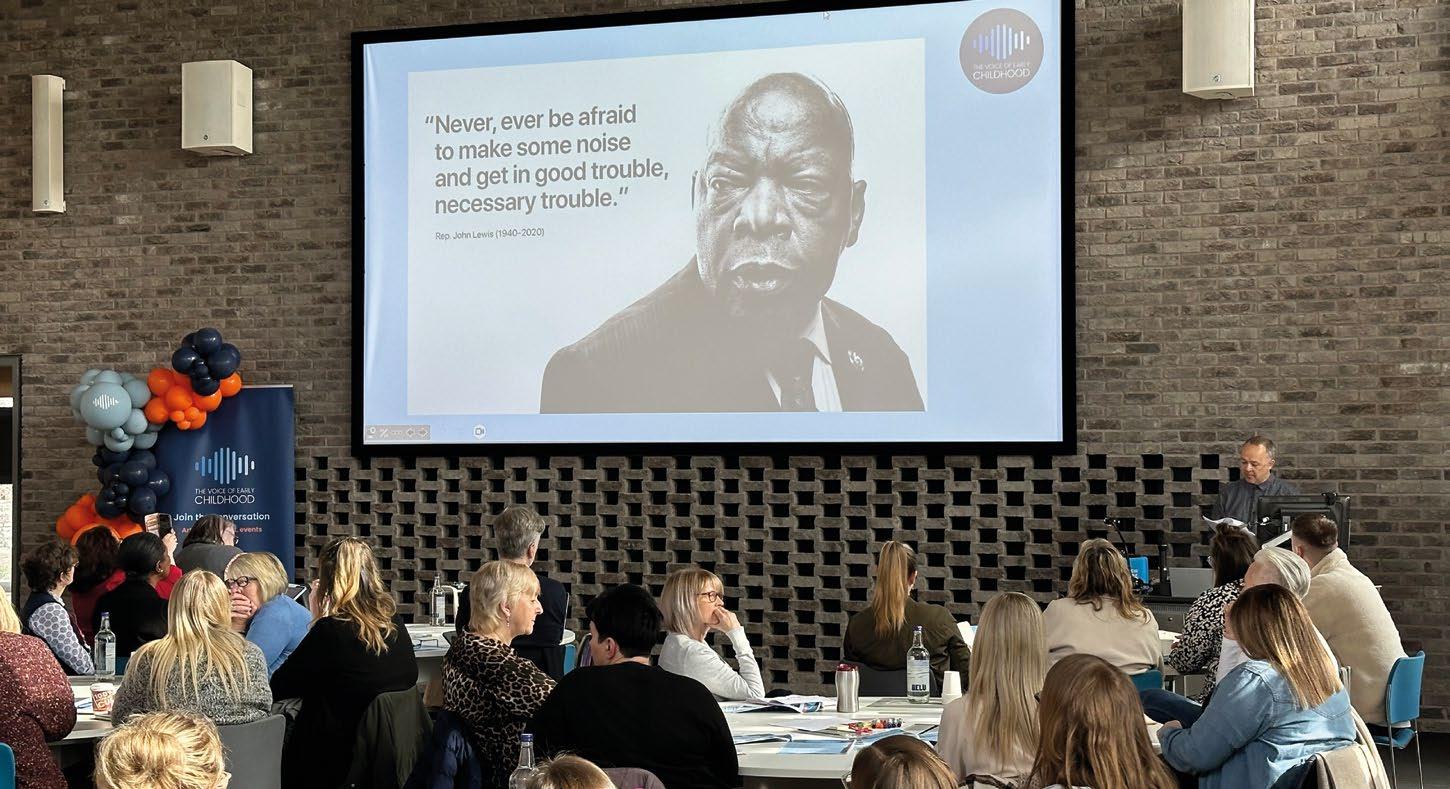

partnership with parents, and I believe we can go so much further than this…
“I propose we bring parents and families into our ‘early childhood bubble’, and not just through standard ‘partnership working practices’.”
events and network, share your side of the education field, advocate for your work in early childhood and take a well-deserved seat at the table.
We also have direct access to the wider population – through parents and carers! The UK has around 8.3 million families with one or more children (Clark, 2024). That is a lot of parents, carers and family members part of the wider society from all walks of life, various sectors and backgrounds. We strive to work in
Parent partnerships – A new, stronger approach
We need to go beyond the usual parent partnership practices we all talk about. How can we do more? More for the children in our care, for the families and for our own early childhood sector.
I propose we bring parents and families into our ‘early childhood bubble’, and not just through standard ‘partnership working practices’. Parents can and should be part of the work we do in ECEC, they should be part of the ECEC community. This includes providing them with a similar level of, if not the same, ‘CPD’ and access to information which is traditionally only provided for educators. We as ECEC providers need to encourage parents and families to be part of our sector in more active and community led ways – by inviting them to conferences,
webinars, training and anything that is not just traditionally parent-focused. Involve them in wider early childhood, and not just around their own child and your setting.
Involving and truly embedding parents and families in the ECEC community has the potential to:
• Strengthen learning and development for young children through deeper shared values, understanding and knowledge of child development and pedagogy across both the educator and parent community.
• Strengthen deeper understanding of, and respect for, the ECEC profession –parents can be fantastic advocates, if we give them this chance.■
If you’d like to connect or share your thoughts, add me on LinkedIn, or get in touch: Angelica@thevoiceofearlychildhood.com
Knovia Group has announced the launch of Shaping Lives, to offer specialist training and apprenticeships in early childhood education.
With 20 years of experience in the early years sector, previously delivered through Paragon Skills, Shaping Lives is designed to support and develop the next generation of educators.
Shaping Lives will deliver best-in-class training in early years education, helping to inspire learning, unlock new and exciting career opportunities, and meet the needs of the sector.
To mark the launch, Shaping Lives is pledging to train 30,000 16 to 19-yearolds in early years by 2030, as part of its strong commitment to the sector. This dedicated focus reflects a growing understanding of the importance of early years education, as well as the need to urgently address evolving pressures on nursery owners and providers.
The early years sector has seen significant change in recent years, following the expansion of free childcare under the Conservative government, set to be extended further by September 2025, and Labour’s pledge to open up an additional 3,000 new nursery classes.
In October 2024, the government launched the first round of funding for up to 300 school-based nurseries. Primary schools can now apply for up to £150,000 of £15million capital funding, to support the creation of 300 new or expanded nurseries across England. This is further to recent changes to government-funded childcare hours. The new measures will offer up to 30 funded hours of childcare per week, over 38 weeks of the year, to children aged nine
months and over, with the policy being delivered through a phased rollout from April 2024 to September 2025.
According to the Department for Education’s latest projections, around 70,000 new places and 35,000 additional early years educators will be needed to meet the demand placed on the childcare sector, through the planned expansion of government-funded entitlements.
To enable greater accessibility to affordable and highquality early years provision, significant investment must be made in training and upskilling the next generation of educators. Not only will this help to meet evolving sector demands, it will also create future pathways to long-term careers, and ensure positive outcomes for young children.
Mark Botha, CEO of Shaping Lives, comments:
“We are delighted to launch Shaping Lives as part of our ongoing commitment to the early years sector. With a dedicated focus on early years education, our specialist apprenticeships will equip the next generation of educators with the skills they need to fulfil their potential and embark on new and rewarding career opportunities.

“We have been proud to deliver early years apprenticeships through Paragon Skills for over 20 years, where we have supported over 2,000 employers across England and many thousands of young apprentices. By launching Shaping Lives, we’ll continue to build on these solid foundations by giving real focus to this
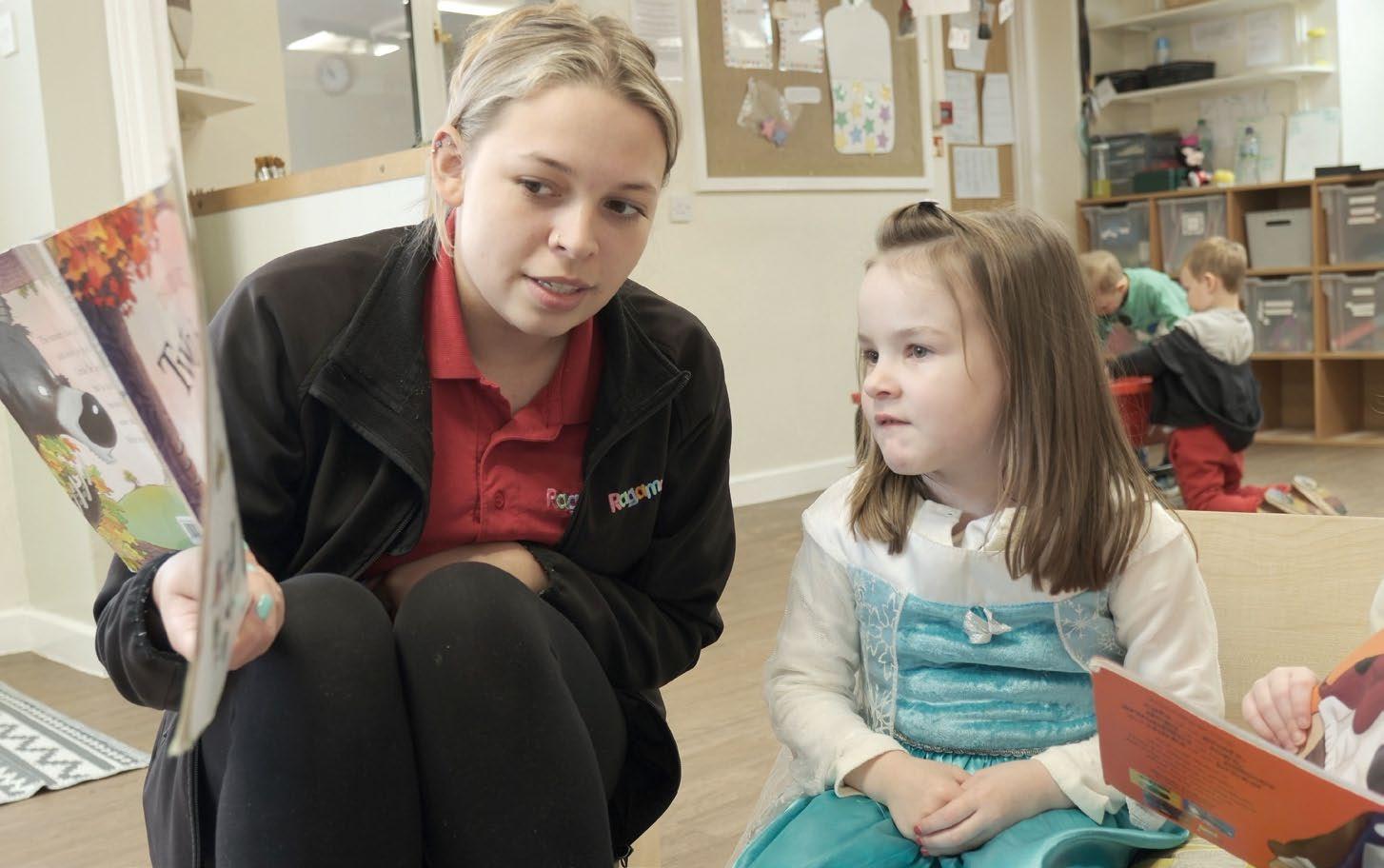

important sector.
“We understand the vital importance of high-quality early years provision, and the pressing need to address emerging skills gaps as well as recruitment and retention challenges. Shaping Lives is designed to meet these needs, with personalised training delivered by our dedicated early years team of highly-skilled and experienced professional tutors.”
Inspiring learning
Shaping Lives aims to deliver outstanding skills and growth programmes for apprentices, helping to ensure excellent outcomes for children aged 0-5 years. The training programme will include SENCo as an optional specialism available to all learners.
Mark Botha continues:
“The first five years of a child’s life are critical for their long-term development. Through our mission to train and nurture skilled educators, we will equip them with the essential skills and resilience to pursue a career with purpose, foster a love of learning in young children and, most importantly, make a positive, lasting impact on their early development.
“Our pledge to deliver 30,000 apprenticeships by 2030 reflects the scale of our ambition and our unwavering commitment to the sector. We want to help drive positive opportunities for educators and, in turn, empower them and their employers to play
a vital and significant role in shaping the lives of young children across the country.”
Award-winning apprenticeships
As a trusted training provider, Shaping Lives builds on two decades of experience in the early years sector, and the successful delivery of tens of thousands of apprenticeships. Through the team’s extensive expertise, sector knowledge and innovative teaching methods, learning is accessible and transformative, opening doors to new career pathways.
Rubie-Grace Lamb, Level 2 Apprentice at Spring by Action for Children, was named ‘Childcare Learner of the Year 2024’ (16-24 winner), in recognition of her passion and energy for early years, as well as her impressive skills, knowledge and willingness to learn.
Rubie-Grace Lamb said: “I always knew I wanted to work in childcare and there was nothing stopping me. I love helping children develop, seeing them grow and watching their personalities blossom - that’s what makes me happy.”
Mark Steed, Early Years Educator at Dottie Tots Nursery School, entered the sector as an older apprentice and was named ‘Childcare Learner of the Year 2024’ (25+ winner), in celebration of his strong commitment to learning.

Nicky Scullion, Nursery Manager at Dottie Tots Nursery School, said: “Mark has a love for the children
that just shines through - they all want to be with him all the time. Everything that Mark does, he does to the best of his ability. Some of our families don’t have male role models so from that aspect too, it’s amazing for our children.”
Mark Steed said: “The most important thing is looking after children and helping them to see the world differently - getting them enthused and inspired about the world around them, honing the skills that are already burgeoning, and making them feel positive about themselves. When the children have a positive story to tell their Mum and Dad, that’s when everyone’s faces light up, so you can always make a difference there.”
Shaping your tomorrow, today
Shaping Lives represents a commitment to fostering a generation of engaged and skilled educators, with a passion for enhancing young children’s early development. It also reflects the wider Knovia Group purpose of supporting the creation of measurable social impact and professional mobility.
Mark Botha adds: “We’ll continue to champion the wealth of career opportunities in early years, and fulfil our commitment to better deliver for the sector by investing in the educators of today to ensure brighter outcomes for children. As part of the Knovia Group, Shaping Lives will deliver exceptional results for its learners, employer partners and the wider sector.” ■
For more information, visit www.shapinglives.co.uk

Nursery owners and early years leaders attending Nexus Media Group’s Education Summit last month heard from panels of experts discussing the challenges and opportunities around growing a nursery business
According to the Department for Education’s latest projections, there’s a need for 70,000 additional early years places by next September, to deliver the government’s commitment to the expansion of funded childcare places. For nurseries looking to expand, it seems the demand is there, but recent research released by Ofsted shows capacity is not evenly distributed across the country, with some of the most disadvantaged areas in need of the largest uplifts.
As nursery owners and sector experts gathered at London’s Business Design Centre last month to attend Nexus Media Group’s Education Summit, the policy landscape was front of mind. Speakers discussed the opportunities and challenges thrown up by the government’s plan to deliver 3,000 school-based nurseries. Recently published guidance outlines ways in which private, voluntary and independent (PVI) sector settings can work with schools, which have been invited to apply for £150,000 to set up provision on site.
Cheryl Hadland is founder and chair at Tops Day Nurseries which owns 33 nurseries in the south of England, two of which are on school sites. She said
“According to the Department for Education’s latest projections, there’s a need for 70,000 additional early years places by next September.”

the school-based nurseries initiative was both “a challenge and an opportunity”.
“School leads are not generally entrepreneurs, we are entrepreneurs, so there is space for working in partnership,” Hadland said. Challenges she set out included accessibility issues, with nursery parents wanting to drive up to the entrance, and the differences between school and nursery opening hours,
Purnima Tanuku, chief executive of the National Day Nurseries Association, questioned the fact that the majority of local authorities have not yet distributed
capital funding set aside for PVI settings to expand to meet projected demand.
“Why is that capital funding delayed but all of a sudden the 300 schools they want to set up as a pilot, that funding is fast tracked?” she asked. Hadland agreed: “We have not managed to get a bean from our local authority so far, that is not through lack of trying.”
She also said PVI settings delivering provision in schools would need some protection around the length of the contract and notice period. “We have been saying to members don’t agree to anything less than 10 years,” she said.

Daniel Cohen, head of business development at MTM Consulting, talked to delegates about how the nursery market is set to develop in the near future. “We are in the middle of a birthrate contraction, and this is something we need to be aware of given our target market is zero to four year olds,” he said. “The birthrate is 1.6 at the moment, it was 1.8 12 months ago and it’s not looking like it will improve until probably around 2032.”
However as with current capacity, the decline in birthrate varies geographically, he said. “It depends on where you are in the country, the demographics you have surrounding the nursery, and what businesses are around the setting – are there large hospitals or factories which have an impact on potential demand?”
Sarah Mackenzie, chief executive of Storal, which owns 30 nurseries, pointed out that choosing new locations to expand into was not just a question of demand, but also the ability to recruit. “Sometimes you will be in an area where recruitment is relatively easy, and

sometimes you have an area where it’s quite tough, and one of the challenges is getting that good match between an area where we have the demand from families for our brand and business model but it is also an area where we can recruit,” she said. “Sometimes we look at what can we do to bring people in from a neighbouring location that doesn’t have that recruitment challenge.”
David Eaves, director, childcare and education at Christie & Co, said the sector had seen an increase in leasehold, as opposed to freehold, sales. “Increasingly we are seeing owners of nurseries, when they come to sell, deciding to keep the property and lease that to the buyer, and retain a rental income,” he said. He also highlighted an increase in the size of nurseries that are being sold. “In terms of settings we have sold to small group operators, the average size of nursery has been 85 places compared to 62 last year,” he said. “With the funding now in place for younger children, they require more space, and those economies of scale are drawing people to larger nurseries.”
Helen Robinson, principal associate solicitor at Birdi & Co, said buyers were increasingly interested in gathering operational information on a setting as part of a transaction, often in the form of a long and involved questionnaire. Helena Deacon, head of M&A at The Old Station Nursery Group which comprises 78 nurseries across the UK, said: “Ultimately a sales process means someone is going to lift up the bonnet of your business and have a good rummage around so anything you can do to be on the front foot with that is definitely worth doing beforehand.”
When it comes to growth, a strong senior leadership team is key, said Amol Devani, chief executive of Bright Little Stars Nursery which runs six settings in London. “If you are looking to expand the first thing you need to think about is your management team,” he concluded. “If you have got management that’s not quite right, or practice you’re not happy with, when you expand all you’re really doing is exporting weakness. Especially if you are expanding quickly, it is important to pause and get these things really right.”■

Family First’s annual conference was filled with magic and wonderment with a special circus theme
The big top isn’t the most obvious setting for a nursery group’s managers conference.
But Family First managed to breathe new life into their annual get together where the themes of resetting, refocusing and strengthening their community were presented against a backdrop of dazzling circus acts.
James Chaplin, Nursery Director, was the driving force between the event which was inspired by The Greatest Showman. He said there were clear parallels between the job of nursery managers and P.T Barnum – the ringmaster played by Hugh Jackman in the smash hit film.
“It’s never easy to strike the perfect tone for these gatherings, but this time I genuinely think we nailed it,” he said.
“The event empowered our teams to embrace their roles as ringmasters in their own settings, taking charge of their environments with confidence and creativity.
“Adversity followed Barnum at every turn—facing financial struggles, losing his venue, and at times feeling like hope was lost.
“Yet, through perseverance and creativity, he always found a way to
“Their heart and souls lie in their unwavering dedication to creating happiness for the children and families they serve.”
overcome these challenges.
“Nursery managers experience similar pressures, from unexpected staff turnover to tough inspections, but they too must remain resilient, adapting and innovating to ensure the best outcomes for their teams and the children in their care.
“Barnum used his inventive spirit to create a magical experience with limited resources—whether it was crafting a wishing machine for his daughter or hosting his circus in a tent to cut costs— and nursery managers must find smart, efficient solutions to deliver exceptional care while managing tight budgets.
“Barnum famously said, ‘The noblest art is that of making others happy,’ and this rings true for every nursery manager.
“Their heart and souls lie in their unwavering dedication to creating happiness for the children and families they serve.

“Our organisation naturally embodies a family-first culture, and the big top symbolised the creativity, teamwork, and resilience needed to keep that spirit alive.
“We want the managers to lead with passion and ensure every child’s experience is as magical as possible, even in the face of challenges they face.”
CEO Tony Page opened the event by discussing Family First’s sense of belonging and the culture everyone is looking to build, emphasising how listening to teams across their nurseries was crucial to fostering a supportive, inclusive environment.
Early Years Director Emily Burgess then led an insightful session on quality, alongside her team, exploring how everyone had the potential to improve



and innovate in all they do.
The team also welcomed Lead Happiness Consultant, Dave Keeling from Laughology for a burst of energy and humour with his Flip it Thinking session focusing on strategies to manage a positive work-life balance, support interactions with colleagues and help make connections.
James added: “The final sessions focussed on retention and recruitment – the fine balance of finding the right people, while keeping our most loyal team members, a juggling act for us, and every organisation.
“It became clear our strong, positive culture will be key in maintaining this balance.
“We also emphasised our commitment to working in partnership with Realise to bring apprenticeships to the forefront— not just for new starters, but for anyone within the company who wants to grow and develop their skills.”
The conference ended with an awards evening, celebrating a host of fantastic
achievements across Family First. Amongst the categories where people were honoured were Best Newcomer, Behind-the-Scenes Superstar, Nursery Manager of the Year, and their very own Lifetime Achievement Award.
Katie Cartwright, Manager at Just Imagine Wickford – Station Avenue Day Nursery in Essex won two awards for the financial performance of her setting.
She was full of praise for the event.
“This was the best conference we’ve had, by far,” she said.
“Having the theme made it more fun and less corporate but still delivered the message to everyone who attended.
“It was lovely to see the time and effort which had gone into it.
“I loved seeing people getting rewarded and recognised for their hard work – both managers and the support team, too.
“We don’t get the chance to catch up with everyone too often, especially in person, and moments where we gather together are precious.”
Hannah Lewis, Manager at Freshfields
Nursery School in Stratford upon Avon, added: “It made me realise what a huge support network I have available, and that we are all striving for similar outcomes.
“Spending time with other managers was great, as well as the support team, plus getting to see the executive team in a slightly different light.”
Michele Falconer, Family First’s Apprentice Lead said the day had left everyone who attended feeling positive about the future and refreshed to make a difference in their settings.
“It was an incredible day, full of surprises and differing experiences,” she said.
“Being greeted by stilted performers at the entrance was an early sign that this wasn’t going to be like any conference anyone had attended before.
“There had been clues in the preview that something circus-like was coming, but I’m not sure the managers fully expected the whole big top experience.
“The executive team were fully immersed in it, and it was great to hear their presentations.”
James said he was delighted that thinking outside the box had led to such a successful event.
“It was a day filled with inspiration, sharing of knowledge and most importantly laughter, and it confirmed our collective goals,” he said.
“As we look ahead, there’s no doubt that the future is bright—and we are ready to achieve it together as one strong family.” ■
For more information about Family First visit https://familyfirstnurseries.co.uk/

Whether it’s sharing ideas, supporting their teams or getting involved in the local community, nursery managers across the country are going that extra mile. We round up some of the things you’ve been getting up to

When Lisa Daniels, manager at Cotton Tails Too day nursery in Rubery, Birmingham, was recently ‘splatted’ by a custard pie it wasn’t because one of the children had run amok after a cookery session – it was part of Cotton Tail nursery group’s mammoth annual fundraising initiative for Birmingham Children’s Hospital. The group, which has four nurseries, raised £2,500, bringing their total donations to the hospital to more than £40,000 over the past 32 years.
“We have a strong connection with Birmingham Children’s Hospital, as over the years there have been quite a few of our children who have been treated there, including unfortunately two at the moment,” said Sophie Perry, educational director at Cotton Tails. “Alongside raising funds for the hospital, we also try to create more awareness around the charities that support those children or focus on their conditions.”
As well as raising money, the nursery group has a strong relationship with the hospital. In the past, staff have visited the wards dressed as Minnie and Mickey Mouse, and a group of managers recently received a tour of a new department building which had been partly paid for by their annual fundraising week.
Special events take place throughout
the week, culminating in a summer fete which included the ‘splat the manager’ stall, with both sponges and pies available for splatting. “There were three sponges for a pound – all the children loved throwing them – and the highest bidder, who happened to be our deputy manager’s fiancé, got to throw a nice big custard pie right in my face!” said Daniels.

Niamh Manning, centre director at Busy Bees Cheltenham Wellington Road, is one of nine Busy Bees employees who took part in an international talent exchange programme to Asia in October. The team members joined a cohort of 30 colleagues from across the world on a journey to Singapore, Vietnam and Malaysia from 14 October.
The talent exchange programme aims to give Busy Bees employees handson experience of early years care and education operations in another country, as well as sharing international best practices and different working cultures. The team members were chosen in recognition of their commitment and dedication.
The team spent three weeks working in Busy Bees nurseries, exploring the latest global trends in early years care and education, and collaborating on innovative projects.
“I feel incredibly lucky to be representing Busy Bees with being chosen for the talent exchange programme this year,” said Manning, before she set out on her adventure. “I hope to bring back lots of ways to support my team and families to ensure the best start in life for our children. What I’m looking forward to the most is getting to know different colleagues from all around the world and comparing how similar but very different Busy Bees is. I feel that we have a lot to learn from each other to bring all cultures together and complete an amazing project to support each other within our Busy Bees journey.”

The manager of a Northumberland nursery was “blown away” by the response to a crowdfunder set up to raise funds to replace resources, equipment and flooring after sewage-contaminated floodwater forced it out of its building. The ground floor of Kerrie’s Cherubs Childcare in Blyth was flooded with 10 to 15cm of water after the town was hit with a month’s worth of rain in 24 hours. Nursery manager Faye Young said it took just 45 minutes for the nursery to become flooded, with staff members wading through the street to carry children to safety.
“We were absolutely devastated how ruined our nursery is. With it being
sewage and rainwater all our floors have had to be removed and all resources can’t be used. There is tens of thousands of pounds worth of damage,” said owner Kerrie Barratt.
Due to the nursery being in a high flood risk area the excess on the setting’s insurance is £10,000, and the setting started a Go Fund Me appeal to raise funds. The nursery received more than £2,500 in just eight days, while parents have chipped in to buy replacement learning resources. Under Ofsted’s 14-day exemption rule, which allows temporary unregistered provision, the nursery moved to a local church hall for a short period of time.

Ashley Webb, manager of Happy Days Nursery and Pre-School in Droitwich, celebrated the setting’s first year of operation with a cheerful event attended by former mayor of Droitwich Spa Kate Fellows, staff members and children. Webb, a finalist in NMT’s ‘Nursery manager of the year’ category at the national NMT Nursery Awards, was presented with flowers and a certificate at the event, to mark her achievement.
“I am so proud of the team at Droitwich and how much we have achieved in our first year,” said Webb. “It’s a privilege to have been given ownership of a brand-new purpose-built setting that enables the practitioners to implement the ‘Happy Dyas Where Children Shine’ curriculum to its full potential.”
She added: “Parent partnership is something we pride ourselves on and our
weekly stay and plays have helped to build these strong bonds. We have also worked hard to gain our eco-school’s green flag and are looking forward to working towards developing this area further over the coming year.”
Webb’s future plans include developing links with local nursing home Woodland View with weekly visits enabling the children and residents to learn from each other.

Dreghorn Preschool in Edinburgh secured £37,908 in funding from the Ministry of Defence’s Armed Forces Families Fund Early Years Programme in October. The setting, which is located in the heart of the service families accommodation within the Edinburgh Garrison, will use the funding to expand its capacity, allowing more service children to attend. It will pay for the pre-school to employ a dedicated breakfast club champion, responsible for running the club and ensuring all children have access to a well-balanced, nutritious breakfast.
“The funding will allow us to create a nurturing dining area, where our youngest children have the opportunity to develop essential lifelong skills as they prepare, serve and eat in an unhurried and sociable way,” said Helen Mullen, manager of Dreghorn Preschool. “It will enable us to continue our journey to excellence ensuring all children using our service have the opportunity to grow into responsible and confident individuals”.
Other initiatives awarded funding included Naval Under Fives in
Portsmouth which received £10,000 to support the opening of a new facility and Portsmouth City Council which received £42,070 to develop a network of Armed Forces-friendly settings.

At Lavenders Day Nursery in Bedford the spotlight was on staff wellbeing as the setting marked World Mental Health Day in October with appreciation activities and initiatives. At the Childbase Partnership setting practitioners were delighted to receive a personalised mug embellished with their initials and shortbread biscuit decorated with a positive quote, as well as enjoying a special hot chocolate station, filled with different toppings to enjoy while taking the time to talk.
Lavenders Day Nursery manager Dizzie Newberry said: “Creating a safe space for dialogue and connection is crucial for building a supportive and compassionate work environment. Making sure to check in with each other, share our thoughts and feelings, and simply enjoy a hot chocolate together can make a world of difference in nurturing our mental health and strengthening our team dynamics.”
The children also took part in activities to better understand their emotions and encourage kindness.■
We know managers are doing fantastic things all around the country, If you have an achievement or a new initiative you’d like to share, contact: charlotte.goddard@ nexusgroup.co.uk
The role of nursery manager is highly rewarding, but there may come a time when managers want to progress their career further within early years
There are a range of roles which managers might decide to move into, including:
• Regional or area manager overseeing a group of nurseries.
• Specialist within a large group, for example, quality development manager.
• Working as a trainer or assessor on childcare courses.
• Working for Ofsted as an inspector.
• Becoming an independent consultant.
• Setting up their own nursery or preschool, or start up a nursery franchise. The role of regional or area manager is the most obvious next progression, says Matthew Sheppard, senior principal consultant for nurseries and early years at recruitment company Compass Associates. However, regional roles are obviously not as abundant as nursery manager roles, and larger groups often promote internally rather than hiring from outside. “A bigger group had got the facilities and network, and have internal resources allowing them to train someone and pass on experience,” says Sheppard.
If a group is looking at external candidates for a post rather than promoting from within, they often prefer to appoint someone who is already an area manager rather than taking on a nursery manager looking for his or her next role, says Sheppard. He often advises managers to take a sideways step into a small group as area manager, before looking for roles in a larger group.
Sheppard advises those looking to become regional managers to think about work-life balance. “If you are lucky there will be a cluster of nurseries where you live but you might find that you have to travel an hour and a half, or stay overnight,” he warns.
At the operations director level, competition is even fiercer as employers

sometimes look outside the sector to industries like hospitality or retail, where people may have more experience of business needs. “If you want to go into operations, a business or management degree could help your case, but experience also counts – if you have looked after a large cluster of nurseries and your remit has developed both financially and increased in size, an employer is more likely to prefer experience and a proven track record, rather than holding a degree,” says Sheppard.
How can nursery managers who know they want to progress their career prepare for their next role? Sheppard says employers look well on managers who have turned around a setting from Inadequate to Good or Outstanding, and will also look at how occupancy has increased under a manager’s auspices. On the other hand, a manager may have become a support manager helping with neighbouring settings. Also having been nominated for or won sector awards is also a good sign to potential employers, he says.
Locality also plays a role in career
progression. “For example, in the Southwest there are only a handful of nursery groups – if someone starts at one, then progresses to another there may only be one other group they can go to,” says Sheppard. “In such a close knit environment you really want to leave a job in the best manner possible, not under a cloud, because you don’t who your next line manager might be.”
This is good advice anywhere in the UK, given that mergers and acquisitions are a feature of the sector. Sheppard says: “People sometimes move from larger companies to smaller organisation in order to progress. If you move, your company could be acquired by your previous employer. This is why I stress the importance of leaving in the correct and professional manner.”

My career in early childhood education began with the completion of my National Nursery Examination Board diploma, which set the foundation for my role as a nursery nurse in various daycare settings. I became a nursery manager

after five years and went on to spend two decades managing nurseries across different settings, where I developed a deep understanding of the operational and emotional aspects of running a nursery.
Despite my experience, opportunities for further progression were limited within independent nurseries. This changed when I joined Bright Horizons as a nursery manager and was given the opportunity to enrol onto its leadership talent programme, which helped identify and develop my leadership qualities and boost my confidence. This programme provided me with the tools to take on the role of regional director after three years of managing nurseries at the group and encouraged me to seek out new learning opportunities and challenges.
The skills and experiences gained as a nursery manager have been invaluable in my current role as regional director. Effective communication, team management, and a deep understanding of early childhood education have all transferred seamlessly. However, the role
of regional director demands additional expertise, particularly in HR processes and operational practices. Gaining knowledge in these areas has been essential for overseeing multiple sites and ensuring consistent, high-quality management across the region.
The role of regional director I find great satisfaction in the variety and challenges of my current role. The opportunity to engage in strategic planning, support multiple sites, and continually learn and grow has been incredibly rewarding. The diverse experiences and the supportive team around me contribute to a fulfilling work environment.
The journey from nursery manager to regional director is a testament to the possibilities within early childhood education for those willing to embrace change and seek growth. By leveraging past experiences, pursuing professional development, and seeking support, professionals can navigate this transition successfully. My experience underscores the importance of continuous learning, adaptability, and the value of a supportive
environment in achieving career aspirations.
• Trust your abilities: Have confidence in your skills and experiences. Your background as a manager provides a solid foundation for this new role.
• Be adaptable: Be ready to adjust your plans as situations change. Flexibility is crucial in managing diverse and evolving responsibilities, as is a willingness to learn from every new experience.
• Know your team: Build strong relationships with your team of managers. Understanding their skills and how to leverage their strengths will enhance overall effectiveness.
• Seek support and guidance: Don’t hesitate to ask questions and seek mentorship. The support from colleagues and mentors can provide valuable insights and encouragement.
• Engage with your talent and development team: They can offer bespoke support to help you reach your goals and improve performance.

The best owners are past managers as they understand the industry. My advice to a nursery manager who is looking to open a nursery is absolutely go for it. It will be all-consuming for the first couple of years, but there is honestly nothing better than having parents give you glowing recommendations, happy children and staff not wanting to change jobs because their love their work environment.
I have worked in early years and childcare since leaving school at the age of 18, starting in a creche and moving to a nursery where I worked with children aged eight weeks to two years. I was then promoted to supervisor of the baby/ toddler unit and deputy manager.
Unfortunately, the nursery was run
“Always remember your staff are your biggest asset and the face of your business, so treat them with care and always promote professional development.”
really badly, the owner/manager had no previous experience and left us over ratio all the time to go clothes shopping. The setting was reported to Ofsted and I made the decision to leave. I decided: “One day I will own my own nursery and it will never, ever, be run in that way”.
I moved on to help set up a brandnew nursery, and as the owner had no childcare experience apart from looking after their own children, I stepped into my first role as manager. I continued to work for that company for 10 years and I finally became area manager when we opened up another setting.
I went on to have three of my own children and took on a more administrative role, becoming a business development manager. This gave me more of an insight into the business side of running a nursery including digital marketing and finances.
In 2017 I joined a packaway nursery located in a village hall as manager. We gained an Outstanding grade in our first inspection, a year after I joined, and increased capacity. The owner opened two other settings and I became area manager, supporting managers, helping with staff training and worked very closely with the owner on the finance side.
At the beginning of 2022 the owner of the group of nurseries decided it was time to retire and I felt it was the perfect opportunity to put my life job plan into place. I put in a bid to buy the setting that I had managed for many years previously.
By September 2022, we reopened our doors as Little Minds Nursery and my lifelong dream to own my own nursery had come true. The transition was easy as we were not starting from scratch; we had families already on the books and the staff knew me. The first year was a rollercoaster of emotions and learning curves – there was so much I thought I knew that I honestly didn’t. I had to think about money, funding, bills, staffing costs, and all about HR law. I thought I could work in the nursery all week while still doing the admin/paperwork side of
things, but after almost burning out at the end of the first year I had to work out how I could do things differently. I now focus on quality management, admin and HR while my assistant manager Marie, who is an absolute lifesaver, takes over the smaller admin tasks and is the face of the nursery with the staff.
• You can’t run a nursery by yourself, you need a strong passionate senior leadership team that all have the same vision as you and are able to communicate their wants and needs.
• Draw on your experience of both really rubbish managers/owners you have worked with and amazing ones – it helps you to realise how to work with people and what my expectations would be as a staff member.
• Being present within the setting is really beneficial – staff don’t want owners breathing down their neck but they do want to see their faces within the setting. If you decide to change something within the setting, they understand that you have seen or been involved in how it was previously working.
• Set realistic targets for yourself. All of your dreams and what you want to achieve can’t be completed in a day, so lists, development plans and realistic timescales are your best friend.
• Maths is a good skill for an owners to have. I resat my maths qualification at the grand old age of 38, and I’m so glad I did, as this really does help when you’re trying to work out funding, fees and deficits.
• Develop a thick skin – your nursery is your baby, so you have to learn to filter out comments from parents and staff that are just words, and focus on the issues you can fix.
• Always remember your staff are your biggest asset and the face of your business, so treat them with care and always promote professional development.■























Publish Job Vacancies


Charlotte Goddard finds out about new resources aimed at supporting nurseries to incorporate sustainability into their curriculum and practice
Global crises such as climate change and pollution are damaging the planet, and the children of today are the ones who will have to deal with the fallout. Incorporating sustainability into a nursery’s curriculum, policies and practice is one way of ensuring that good habits around sustainability are embedded in the next generation. Nurseries that are modelled on environmental and social sustainability are also increasingly attractive to parents and investors.
“At the child level it is their world we are going to protect,” says Shanti Flynn, head of education at Storal nursery group. “The change needs to come from that generation.”
For the past 30 years, schools have been able to draw on Keep Britain Tidy’s Eco Schools Programme as a way of both accessing resources around sustainability and accrediting their work in this area. Nurseries have increasingly followed suit, with 1,261 settings currently registered with the scheme, and 639 accreditations issued over the past three years. However, early years settings have had to exercise some ingenuity when it comes to some of the requirements of the programme.
“There were questions that were not related to nurseries, and you had to think outside the box about how that would work,” says Lisa Manston, health, safety
“Nurseries that are modelled on environmental and social sustainability are also increasingly attractive to parents and investors.”
and environment advisor at Childbase. All 44 of Childbase’s nurseries recently achieved a distinction in the Eco Schools Green Flag Awards for the second year in a row. “For example, there was a question relating to prom dresses, and how you can recycle them. Well, obviously our children don’t go to prom, but we do have graduation, and nurseries in close proximity to each other have pooled together and bought lovely little gowns and hats which they share around, so we don’t have to buy separate ones for each nursery.”
Keep Britain Tidy has now revamped the Eco Schools scheme to create a programme specifically targeted at early years settings. “We have had about a 200% increase in nursery engagement over the last three years,” says Adam Flint, national manager for Eco Schools England. “There has been a real interest in early years sustainability, both in terms of education, but also around improving the sustainability of their sites, their policies and their operations.”
Keep Britain Tidy involved nurseries closely in the development of the new
scheme, sending out a survey to those that had achieved the accreditation over the past three years. “We were able to identify which parts of the programme nurseries struggled with, and which parts they enjoyed,” says Flint. “As an example, schools have to select three of our 10 Eco Schools topics to cover, but nurseries felt this was too restrictive, as practitioners are very responsive to the interests and activities of their children.” Early years sustainability expert, Dr Diane Boyd, was also involved in the development of the programme.
Eco Schools: Early Years aims to embed good environmental behaviours into children early on so it isn’t something they have to “adapt to or shift their lifestyle to accommodate” later in life, says Flint. The charity worked closely with nursery groups Bright Horizons, Storal and Childbase to shape the new scheme, gaining feedback from focus groups and sharing drafts of resources.
The scheme offers free access to a wide range of resources and activities, including video content. Starting last month, early years educators can also access free training around educating children and reducing a nursery’s carbon emissions.
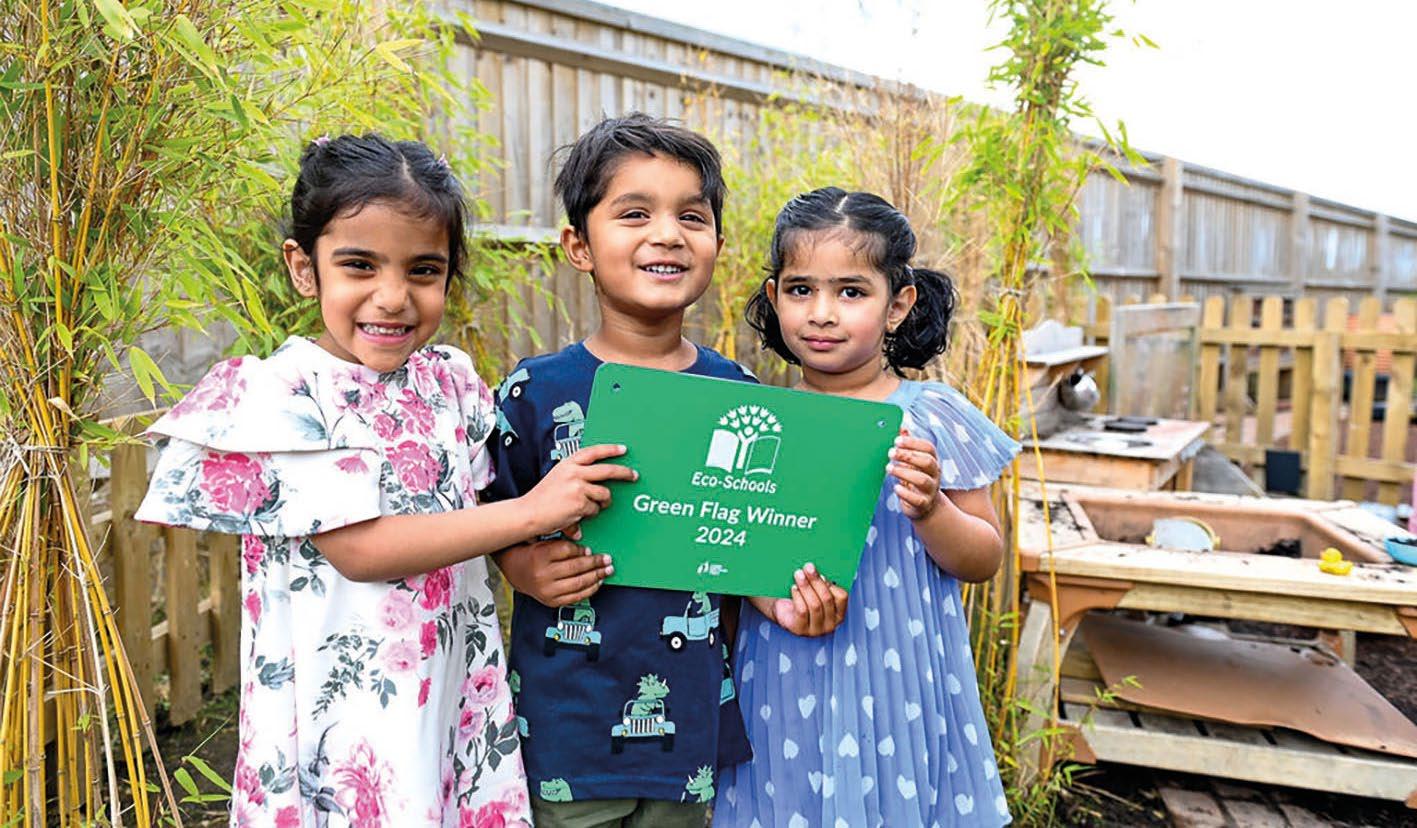

There is a fee of £200 plus VAT for settings that wish to submit their work for accreditation when they have completed the programme. Accredited settings receive the Eco Schools Green Flag Award – an actual green flag for the first year, and a plaque for every subsequent year.
Nurseries taking part in the programme follow seven steps: setting up an eco club; taking part in a site audit; planning and delivering eco-themed learning experiences; implementing sustainable changes; inspiring the wider nursery community; reflecting on how activities were delivered; and creating an ‘eco-promise’ such as a poster, song or poem. Each step includes a menu of potential activities which nurseries can choose from. “For example, step four challenges nursery staff to make two

sustainable changes to their site, policies or operations and we have a list of about 110 you can pick from,” explains Flint. Eco-learning opportunities include ecothemed story, rhyme, or song sessions, play or art provocations intended to provoke or stimulate children’s thinking, curiosity and exploration, junk modelling, and gardening.
“We have put our own eco guidance together, working with Eco Schools,” says Childbase’s Manston. “It isn’t policy – we are not making individual nurseries follow the guidance – but they can choose to.”
Flynn agrees that it’s important that nursery managers don’t feel that the programme has been imposed upon them. “We have looked at making it as easy as possible for our nurseries to be involved – they are so busy and they don’t want ‘yet another project’ put upon them,” she says. “Rather than it being top-led, we have identified eco champions in each setting and have been very clear this is not something the management team has to take on – we want passionate team members to grab this and run with it. By doing it that way we have had a lot of buy-in.” The flexibility of the programme means that settings don’t have to do the same projects or have the same focus, but can tailor their approach according to their community and the interests of the
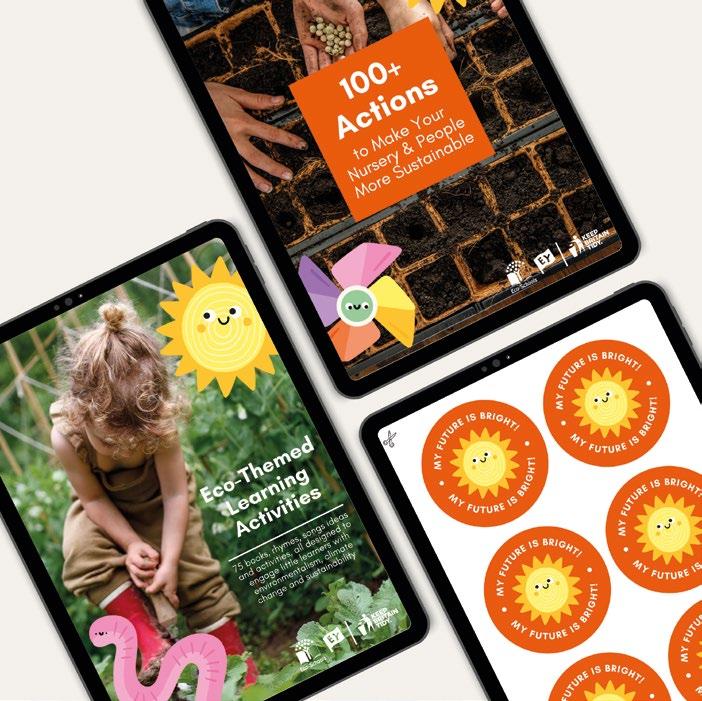
It’s often the younger team members who are most passionate about taking on the eco mantle, says Flynn. “They are so much more passionate about it than people of my generation; they understand about protecting the world, so for me they are the ones who are best placed to influence our youngest children. The role can be part of a team member’s professional development – it is something they can be proud of doing, it gives them that responsibility and accountability.”
Manston is passionate about the importance of embedding sustainability into the early years curriculum. “My daughter was at one of our nurseries,
and the eco-awareness she has is unreal,” she says. “She tells us off if we leave the water running when we brush our teeth, she makes me pick litter off the ground, she asks questions. It is opening the minds of a lot of young children at an early age, which is what we want.”
Storal’s Flynn has been engaged in developing a bespoke curriculum for the group’s settings, and as part of this the organisation has made a conscious
“If we don’t make changes, future generations are not going to have the same world to live in as we had,”
decision to move away from bringing in external providers to deliver activities. “We are a group born from acquisition, so our approach to extracurricular activities was not consistent,” she explains. “Also, we are all about planning according to the interests and needs of individual children, and yet we were allowing people to come in and deliver a very flat one-hour session no matter where the child is in their development.”
The Eco Schools programme fitted with Storal’s new approach of delivering its own extracurricular activities, including a yoga club and a cookery club.
“Eco Schools fitted really nicely into our agenda,” she says. “Our curriculum is very centred around communication and language, and that fits in with the Eco Schools approach.”
It also dovetails with Storal’s corporate approach to ESG (Environmental, Social and Governance). “As a group we have

embarked on our ESG journey; there are the complicated calculations we do around carbon footprint, but it’s about the social and governance side as well,” says Flynn.
Keep Britain Tidy hopes to engage 1,000 nurseries a year over the next five years in its new scheme. “If we don’t make changes, future generations are not going to have the same world to live in as we had,” concludes Manston.■

Child Paths allows you to streamline your operations, easily communicate with parents and empower sta , while enhancing learning for children throughout their nursery and school years.







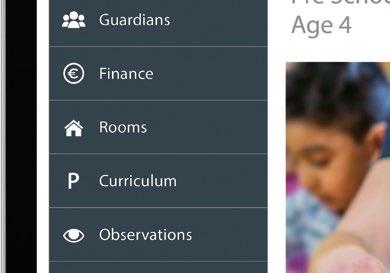





“We moved over to Child Paths at Codsall Community Nursery and couldn’t be happier. The onboarding process was smooth and sta training was really e ective. Parent feedback has been positive and we’re looking forward to using more of the system to support the children’s development.”
Kelly Hill, Director Codsall Community Nursery Wolverhampton, Sta ordshire

Allows for early intervention
Real-time communication
Stand out from your competitors LINKED TO EYFS














“Following the excellent Child Paths training, our sta were so excited about the future with Child Paths and how it would free up so much more time with the children. Just an amazing feeling to have the sta all on board. Thank you so much; this really is going to transform Barney Bear’s Nurseries”
Leah Clarke, Director, Barney Bear’s Nurseries, London

Food, Activities, Nappy Changes and Sleep Logs
Food, Activities, Nappy Changes and Sleep Logs
“We looked at many di erent apps and felt Child Paths was the best fit for us as it’s so comprehensive and easy to use. It covers all aspects of our early years and preschool which helps us go paperless using just one system. The support from the team is amazing, we wouldn’t be without Child Paths now.”
Food, Activities, Nappy and Sleep Logs or
Food, Activities, Nappy and Sleep Logs or
Becky & Steph, Directors, Chy Lowen Early Years Newquay, Cornwall



In our series showcasing the sector’s nursery managers, we find out about Suzanne Charlesworth, nursery operations director at Kamelia Kids Day Nursery & Beach School in Goring by Sea, West Sussex
What was your route to becoming a manager?
I was a finance operations manager for Debenhams, but when I had my second child, I decided working those hours was not for me. I did my Level 3 NVQ in childcare at night school and volunteered in my oldest daughter’s nursery. They then asked me to become a manager at one of their pre-schools.
My Level 3 tutor suggested I move into teaching and assessing, and I went on to teach Level 2, 3 and 5 childcare qualifications at my local college and at university.
When the government changed the qualification requirements and Level 3 students had to hold maths and English GCSEs, the number of students fell, and I decided to go back into nurseries. I managed one nursery in rural Sussex, moved on to another in Brighton and Hove, and I have now been managing Kamelia Kids in Goring by Sea for five years.
My initial experience at Debenhams has given me a good foundation for managing a nursery, particularly on the finance, health and safety and HR aspects.
What is unique about your setting? It’s a standalone, not-for-profit nursery, and our mission is about being inclusive and supporting all the children and the families as much as possible. Historically we have taken in many children with SEND and children under child protection services and that legacy has stayed with the nursery.
The nursery owns a beach hut which it was able to buy at a good price. We have two supernumerary staff who take preschool children to the beach hut twice a week and they spend the morning there. Both have had beach school training through Sussex Wildlife. With our younger children we might go to a nearer part of the beach. Once a year we hold

a barbecue at the beach hut for staff and their families. We also emulate the beach school in the nursery – one of our gardens has a real boat, a mini beach hut, a sand pit, water tray and stones, so the children can continue their learning and play.
What is the impact of having charitable status on the nursery? The difference for me as a manager is it is not about the profit. Of course, I still have budgets, but it is about what we can put back into the nursery. As a charity you can apply for trust funds, and we are privileged to have funding from Children in Need which allows me to employ two supernumerary special educational needs and disabilities coordinators. We also offer charity discretionary discounts for families that are struggling financially, and where we feel a child would benefit from additional sessions.
I hadn’t worked in a charity before, so I had to learn some new skills. There is additional paperwork and different auditors become involved when you have charity status. I must produce a termly report for the trustees and there are lines of reporting if there are any issues or concerns.
What is the most challenging part of your role?
Knowing you can’t please everyone all
the time, and balancing the needs of individuals – the staff, children and parents – with the needs of the nursery.
What is the best training you’ve been on?
My Open University degree. I went to university every six weeks, and the rest of the time was learning on my own. You must use your own initiative, be motivated and have self-discipline.
Which three people would you invite to a dinner party?
Ed Sheeran, because I love his music, he is a great performer on his own and doesn’t need anyone else to back him up. Sir David Attenborough, he would be a great conversationalist and could tell you anything about the world. And I love gardening, so I would invite Alan Titchmarsh.
What’s the one thing you would change about the early years sector?
Recognition by those in power of the vital importance of early years and how children are our future. There are over 200 new Labour MPs who might not know about the importance of early years, and I think getting them to recognise that is the starting point of change.
What three things would you take to a desert island?
Coffee - I must have three cups a day! Two in the morning and one in the afternoon. A hammock to be comfortable, and to make my hammock, an axe, which can also help with lots of other things.
What advice would you give your younger self?
Don’t be afraid to make mistakes, because making mistakes is part of learning and moving forward.■
Upskilling your team to engage in reflective practice and action research can boost staff retention and wellbeing, as well as the quality of provision. Charlotte Goddard finds out about a new resource
Reflective practice is the process of thinking about and analysing your practice, with the aim of challenging, developing and improving it. In a similar way, action research involves considering what needs to be done, taking action, and reflecting on the result.
While sending a practitioner on a training course may upskill them in one particular area, equipping your team to reflect on what they are already doing and take action to improve it sets off a continuous cycle of professional development.
“Staff are your most expensive resource, but also the best resource you have, so when you are leading teams you try all sorts of different things for professional development,” says Sally Cave, headteacher at Guildford Nursery School and Family Centre. “You can send them on training courses, but when they are leading their own learning it has much greater impact on practice improvement, confidence, professionalism and expertise.”
For the past three years Guildford Nursery School and Family Centre has been working with New Zealand kindergarten Seven Stars and charity the Centre for Research in Early Childhood (CREC) in a partnership funded by
“Staff are your most expensive resource, but also the best resource you have, so when you are leading teams you try all sorts of different things for professional development.”

the Froebel Trust. The initial aim of the project was to research and document the effect and benefits of a Froebelian approach on children, families and educators (see box on p?).
Over the three-year period the settings, supported by CREC and educationalist Professor Tina Bruce, took part in a range of action research projects, including listening to children’s voices when they came back from the first lockdown, engaging with nature and play, and exploring community.
CREC supported educators in both settings to develop their skills as researchers and to analyse, document, reflect on and disseminate their findings. “It was very democratic and inclusive, we gave practitioners the vocabulary and means to look more deeply into what they were doing anyway,” says Professor Chris Pascal, co-founder and director of CREC.
The partners learned so much over the course of the programme that they decided to create a free toolkit to enable other settings to engage in reflective practice. “The idea is we use this reflective approach to help others work in the same way, and develop that reflective
community in every setting,” says Pascal. Reflection with Guidance, available on the Froebel Trust website, is an interactive resource including videos, photos, text and templates. “It aims to support educators to constantly learn through reflecting and professionally discussing what they have observed and what the children have done,” says Cave. “It does take time to use, and while that is a cost in itself, the toolkit is free, there isn’t an expensive trainer you have to buy in, and there are no expensive resources you need.”
The toolkit is aimed at leaders and managers in any setting – not just those following Froebelian practice – who will work through the resources with their team. “It can be used by setting leaders who wish to develop their team’s understanding of children’s development and learning,” says Cave. “It helps leaders to support and develop the team’s ability to observe and document practice and improve practice. It can also support whole-setting improvement.”
Practitioners are encouraged to decide what aspect of practice or provision they want to analyse, such as a particular
area of the learning environment, and gather data through observations. The toolkit provides a number of prompts to help guide practitioners’ thinking, listed under four ‘lenses’: ‘context, space, time and seasons’; ‘actions actors and relatedness’; ‘the network of development and learning’ and ‘transformations’. If practitioners look at the use of an outdoor area, for example, they might look ‘through’ the first lens at how it is used at different times of the day, and through the second lens they might consider which children play there and how they interact with adults and each other.
The toolkit provides templates for educators to note down their findings, and support around reflecting on the findings to consider the next step, with discussions ideally facilitated by leaders and managers, or practitioners from another room. They can then make the agreed changes in the setting, or to their own practice. “You could use it in whole teams, small groups, or even as a single person working alone,” says Cave. “However, it’s even better if you have someone external involved, or someone slightly removed, because they can ask those more challenging questions.”
The resource has already been trialled in six different settings, and tweaked according to their feedback. “They said some of the terminology needed explaining, so we’ve added a glossary,” says Cave. “We are also going to record ourselves introducing Reflection with Guidance for those people who don’t
Froebelian principles
Friedrich Froebel (1782 - 1852) was the inventor of kindergartens and a pioneer of early childhood education and care. His key underlying principles include viewing childhood as having a value in its own right, rather than being merely a preparation for the next stage in learning, the central importance of play, and the value of understanding nature and our place in it. Froebel believed that the starting point of a child’s learning should focus on what they can do rather than what they cannot and that children learn best by doing things for themselves. Early childhood educators who engage in their own learning and believe in principled and reflective practice are a key aspect of a Froebelian approach.
necessarily like to read cover to cover.”
Changes made in settings which have already used the toolkit include a realisation of the need to talk through observations with parents, and changes made to the environment, such as placing the mud kitchen in a more enclosed area.
“This toolkit can be supportive and transformative at what is a challenging time for our sector in terms of funding, recruitment, retention and staff wellbeing,” says Cave. “At our setting we have seen improved staff retention and ever-increasing levels of wellbeing.” A survey found that 100% of staff at the setting enjoyed work and felt valued, and feedback from users suggest after using the toolkit educators were better able to describe what they were doing clearly and coherently, especially when talking to parents, colleagues and inspectors.
“We have had no work stress-related absences at all for last three years,” says Cave. “Of course people still get sick, but at one point when I first arrived here I contemplated doing a staff meeting on avoiding food poisoning, as so many people seemed to come down with food poisoning over the weekend,” she laughs.

“That doesn’t happen anymore.”
The boost in staff wellbeing is linked to an increase in confidence and a feeling of ownership, she says. “I can’t make people happy – things happen in their personal lives and we all have difficult things to deal with, My job is to give my team high job satisfaction, and for that you have to give people autonomy. They decide what they are going to be looking at, and they decide what they can do differently.” Often while engaging in reflective discussion, educators come to a better understanding of their own expertise, which can lead to improved confidence.
“It is about putting practitioners in the driving seat,” says Pascal. “They told us being acknowledged in that way helped them grow professionally, they had more of a sense of where want to go in their career, their stress levels are lower, they enjoy work more – they are more enchanted with their job again. When you feel a sense of belonging to a group with shared values you have more confidence, dignity and status.”
The approach can be used by a whole team, from the most to the least experienced. “It doesn’t matter if you are early in your career or experienced, whereas sometimes if you go on a course, it may be a bit too advanced for some,” says Cave. “You get different discussions depending on who is involved – older people can pass on their experience, but often younger people have a different perspective to offer.”
Although the funding has now run out, the partners hope to carry on with the project. “This kind of development opportunity should be everywhere,” concludes Pascal. “This is a vehicle for enhancing professional development, which is something that our workforce needs desperately.” ■
52% OF MANAGERS SAID THEY HAD NO FORMAL TRAINING* DID YOU KNOW?
*Source: peoplemanagement.co.uk

TRAIN WHILE YOU WORK AND LEAD WITH CONFIDENCE
Lucy Lewin, founder and owner of Profitable Nursery Academy and Little Angels (Uppingham), explains why the language used by the inspectorate matters, while Jayne Coward, Ofsted’s deputy director for early years regulatory policy and practice, sets out the changes the inspectorate is making in response to sector concerns
Lewin’s experience
The experience I have endured as a nursery owner through the Ofsted inspection process has been emotionally, physically and mentally exhausting.
The Ofsted framework, with its focus on judgement rather than support, seems ill-suited to a sector where the primary goal is to nurture and guide young minds. The process of judgement, as it currently stands, does not account for the emotional complexities of the work we do, nor does it offer a fair or accurate reflection of a setting’s true quality. Instead of being a tool for improvement, the inspection process often feels like a punitive measure – one that fails to recognise the nuances of early years education. The current system is more about enforcing compliance than fostering genuine growth and development, both for children and for the educators who dedicate their lives to this work.
When Ofsted evaluates early years settings, the language used often reflects a top-down approach, where inspectors are positioned as ultimate arbiters of quality. This can create an adversarial dynamic, where staff feel scrutinised, criticised, and potentially devalued.
Such language can evoke anxiety, fear of failure, and defensiveness among staff. The phrase “being judged” implies a binary outcome – success or failure – which can overshadow the nuances of the setting’s strengths and areas for development.
The stress of being ‘judged’ can lead to a range of negative emotions, including anxiety, decreased morale, and even burnout. Early years practitioners are often deeply invested in their work and may take criticisms personally, affecting their self-esteem and job satisfaction. Moreover, the language of judgement can
create a sense of inadequacy or failure, particularly if the outcome is less than ‘Outstanding’. This can be demotivating, leading to a focus on meeting regulatory demands rather than fostering genuine improvements in practice and care.
For many early years practitioners, their work is not just a job but a vocation. The language of judgement can undermine their professional identity, making them feel that their expertise, commitment, and passion are reduced to a simplistic rating. This can also contribute to a culture of compliance over creativity, where the fear of negative judgement stifles innovation and the willingness to take risks in pedagogy and practice.
Language shapes relationships. If Ofsted adopted a more inclusive, collaborative language, it could foster a sense of partnership rather than hierarchy. Terms like ‘evaluation’, ‘review’, or ‘assessment’ might still acknowledge the regulatory role of Ofsted but with less of the punitive connotations of ‘judgement’.
Collaborative language suggests a process where the regulator works alongside practitioners to achieve shared goals, focusing on growth and development rather than merely passing judgement.
Inclusive language would emphasise a balanced approach, acknowledging both strengths and areas for improvement. For instance, instead of labelling a setting as ‘Inadequate’, the feedback could focus on specific strengths while clearly outlining steps for development. This approach encourages a growth mindset, where settings are seen as evolving entities with the potential to improve, rather than being stuck with a static label.
By using more supportive and constructive language, Ofsted could help reduce the psychological burden on practitioners. Phrases like ‘opportunities

for growth’ or ‘areas of focus’ are less likely to trigger defensiveness and more likely to be received as helpful feedback. Such language can help practitioners feel valued and respected, which is crucial for maintaining morale, encouraging professional development, and ultimately improving outcomes for children.
Inclusive language can help shift the focus from compliance to continuous improvement. If the language used by Ofsted promotes a narrative of ongoing learning and development, settings are more likely to engage in reflective practices and pursue innovation. This cultural shift can lead to more sustainable, long-term improvements in quality, as staff feel empowered to take ownership of their professional growth.
This shift is not merely about softening language but about recognising the powerful role that words play in shaping the experiences and behaviours of those being evaluated. A regulatory approach that prioritises respect, collaboration, and growth could lead to better outcomes for practitioners and the children in their care.
For the sake of fairness, transparency,
and the mental health of educators, the Ofsted inspection system must undergo significant reform. It must move away from a model of judgement and towards one of support, where the goal is not to penalise but to foster genuine improvement. Only then can it truly serve the best interests of children, educators, and society as a whole.
Ofsted’s plans for reform
Ofsted’s Jayne Coward, deputy director for early years regulatory policy and practice, provided delegates at Nexus Media Group’s Education Summit last month with an update on changes the inspectorate is introducing following its Big Listen consultation.
“The tragic death of Ruth Perry last year was a catalyst for change but that case for change had been building for much longer,” said Coward. “We hope the Big Listen has given us a chance to reset our
on potential changes to its early years inspection and regulatory framework in January next year. “This is not a new framework, we are not trying to throw the baby out with the bathwater,” said Coward. “We want to build on what is good and what people in the sector have told us works, but we also want to look at elements that are causing frustration and where we could do things better.”
The consultation will cover removing the single word judgement for nurseries as has already happened with schools, and looking at the introduction of a report card system. “It is important we take time to work with the DfE on this issue, particularly around single word judgements and the interdependency with local authorities around the allocation of funding,” Coward said.
The body also intends to launch an Ofsted Academy to transform the

years sector. “There are a number of areas we wish to focus on in early years, including reviewing how we register, inspect and regulate multiple providers,” said Coward. “That will require some changes in legislation but it will be really important we talk to those working in the sector that are part of these large chains in order to get that right.”
In conclusion, she said: “There is a lot of work to do, but I think there is a



















School group Dukes Education has acquired Pippa Popins, a family-owned portfolio comprising four nursery schools located on the borders of Kensington, Notting Hill, Holland Park, Chelsea, and Fulham in London.
Pippa Pop-ins was founded in 1992. The deal is considered to be the highest value independent small nursery group OpCo transaction to have been completed in the UK.
Dukes Education was founded by chairman Aatif Hassan in 2015 and operates more than 30 school brands teaching 10,000 pupils as well as summer schools, activity camps, and a university entrance consultancy service.
Hassan said: “I am thrilled that Pippa Pop-ins Nursery Schools is joining the Dukes Family and extend a very warm welcome to principal Rachel Watson, the staff, and families. I have long admired the success of these wonderful nursery schools having originally visited for my children over 10 years ago. Pippa Pop-ins nursery schools, following the best of traditional standards, wholly align
with our foundations for creating a happy childhood, a fulfilling future, and an enduring love of learning.”
Business property advisor Christie & Co facilitated the sale.
Courteney Donaldson, managing director, childcare and education at Christie & Co, said: “I first visited Pippa Pop-ins nursery schools over 15 years ago and was immediately struck then by how truly exceptional they were. Following our client’s acquisition of the business in 2012, this prestigious portfolio of leading London nursery schools has further expanded via the opening of a school in Kensington. Pippa Pop-ins is an exemplary business and, with their exceptional track record as world-class educationalists, we are delighted to have facilitated a sale to Dukes Education.”
Pippa Pop-ins Nursery Schools was sold for an undisclosed price.
Berkshire, a 53-place nursery that was established more than 20 years ago by
Emma and her husband David are selling to allow them to explore other ventures outside the sector.
Emma Tennant said: “I wish Bright Stars all the very best and can’t wait to see the nursery keep growing from strength to strength.”
Kirsty Ibbott, M&A director at Bright Stars, commented: “This charming nursery perfectly complements our dedication to our unwavering commitment to nurturing the growth and wellbeing of children. Teepee has
“The future of Teepee Private Day Nursery fills us with great enthusiasm. Together, we will strive to maintain a nurturing and inspiring atmosphere, enabling children to flourish and achieve their utmost potential.”
Business property advisor Christie & Co facilitated the sale.
Teepee Private Day Nursery was sold for an undisclosed price.

Experienced nursery sector operators John Tomlinson and Michelle Aston acquired the former residential property in 2019 and converted it into a 60-place day nursery. It is rated ‘Good’ by Ofsted.
John is selling to allow him to explore other ventures, while Michelle will continue to manage the setting under its new owner.
John Tomlinson said: “I am very sorry to have sold Broughton Cottage, as Michelle and I had started it from scratch, but I realised I had taken it as far as I could. Out of all of the interest, we favoured a small
and wanted the nursery to maintain its core values, which we wanted for the staff, children and parents who chose Broughton Cottage.”
Business property advisor Christie & Co facilitated the sale.
Sophie Willcox, director, childcare and education at Christie & Co, said: “Broughton Cottage is an excellent, profitable, and well-regarded freehold day nursery. I am delighted to have brokered the sale of the setting and was not surprised to have received the level of interest we did as it is unique in its offering.”
Broughton Cottage Day Nursery was sold for an undisclosed price.



Forest and farm school nursery group, Little Barn Owls, has purchased Brookfield Day Nursery & Holiday Club in Crawley, Sussex, which caters for up to 80 children aged three months to five years at the nursery, and up to 12 years at the holiday club. It is situated on a a large plot with over an acre of gardens.
Little Barn Owls operates four other settings across Sussex.
Hayley Peacock, director at Little Barn Owls, said: “We are thrilled to have found the perfect setting to add to the LBO group. The high standards and expertise of the team, combined with a property with land is a rare find and one that suits us wonderfully. Our farm school animals and
rewilding project will really flourish here.”
Business property advisor Christie & Co facilitated the sale. Sophie Willcox, director, childcare and education at Christie & Co, said: “Brookfield Day Nursery is one of several freehold nurseries I have sold in the South in the last month or so. Alongside my recent leasehold transactions, it shows that there is demand for both types of businesses.”
Brookfield Day Nursery & Holiday Club was sold for an undisclosed price.
First-time buyer, Leicestershire accountant, Anup Chauhan has purchased The Playhouse Nursery, a Good-rated community day nursery catering for 33 children aged from newborn to five years located in the Coventry suburb of Styvechale.
Established in 1994, the setting was previously owned by Mary Kefford who is retiring.
Kefford said: “After almost 30 years as a day care owner, I decided the time was right for me to retire. Through teamwork and good liaisons, we were able to achieve a sale with an agreed handover period which enabled a smooth transition with no disruption to either children, parents or staff. It also helped me to step back offering support where necessary. It has been reassuring to know that I am leaving The Playhouse Nursery in a good position to thrive and continue the good work and reputation achieved.”
Chauhan said “I entered nursery ownership because of my
passion for early childhood education, aiming to create an enriching and nurturing environment for children. The Playhouse Nursery appealed to me due to its established reputation for quality care and the team of dedicated staff. I look forward to adding fresh perspectives and insights to the nursery while maintaining the fundamental values that make the Playhouse a unique and cherished space for our little ones.”
Business property advisor Christie & Co facilitated the sale. Funding was sourced through Christie Finance.
Lawrence Roberts, director at Christie Finance, said: “With more positive signs that the UK economy is moving forward in the right direction, both high street and challenger lenders are starting to support more clients, especially in the children’s day nursery sector. I know Anup will be a great success and I look forward to supporting him on his next purchase!”
The Playhouse Nursery was sold for an undisclosed price.


at the nursery, and up to 12 years at the club.
Established in 1988, Windsor Kindergarten has been owned by Sangeeta and Stephen Gardiner since 1994. They recently decided to sell to retire from the sector.
The Gardiners said: “Having developed the nursery over the last 30 years, we wanted to ensure that whoever took over the setting would continue with our ethos of serving the local community. This includes providing the children with the very best environment for them to grow and develop both socially and educationally. Sophie was instrumental in supporting us throughout the marketing of the nursery and ultimately finding Harbir who we know will sustain our ethos enabling the nursery and staff team to continue to develop.”
Randeva said: “After previously selling my two nurseries, I knew for me to re-enter it would have to be for a unique and special opportunity. As soon as I visited Windsor Kindergarten, I knew it was the one. I am excited to carry on Stephen and Sangeeta’s legacy.”
Business property advisor Christie & Co facilitated the sale.
Sophie Willcox, director, childcare and education at Christie & Co, said: “Windsor Kindergarten is a wonderful leasehold nursery in the centre of Twickenham. I knew that Sangeeta and Stephen wanted to find a buyer who would cherish their business and allow it to flourish. Having worked with Harbir previously, I knew they would be the perfect fit.”
Windsor Kindergarten was sold for an undisclosed price.


Local operator Headstart Colchester has purchased Daisy Chain Nursery in Maldon, Essex.
Established in 2002, the business comprises a day nursery, breakfast club and after-school club. The nursery accommodates up to 74 children aged three months to five years and was rated Good in all areas at its most recent Ofsted inspection.
The vendor is retiring in Australia.
Childcare and education business broker Redwoods Dowling Kerr facilitated the sale.
Redwoods Dowling Kerr’s sales negotiator Karrina Lee said: “It was a pleasure to have assisted our client with the sale of her business, and I am thrilled that she can now enjoy her retirement in Australia. I wish the buyer every success for the future, and I am positive that Daisy Chain Nursery will make a fantastic addition to their established group.”
Nursery operator Ivytree Nursery has purchased Kish Kindergarten, a bilingual nursery in Richmond, London.
Established in 1995, Kish Kindergarten is registered for 32 children aged from two to five years. The nursery focuses on nature-based learning alongside developing children’s language in both German and English.
Ivytree Nursery is a private nursery school in Hampton, London which was established more than 25 years ago and has an Outstanding Ofsted rating.
and education
Redwoods Dowling Kerr’s sales negotiator Karrina Lee said: “Congratulations to both buyer and seller on this transaction. I wish both the best of luck in their new ventures.”
First-time buyer Fourwinds Group has acquired a group of three childcare settings in Stirling, Scotland, comprising Lecropt Nursery, Old Doune Road Nursery, and Bridge of Allan Out of School Care.
Established more than 20 years ago, Lecropt Nursery and Old Doune Road Nursery work in partnership with Stirling Council to provide care for children aged three months to five years, with a combined capacity for 88 children.
Bridge of Allan Out of School Care, adjoined to Bridge of Allan Primary School, operates a breakfast club and after-school club during term time. Providing care for 30 children aged four to 12, the club opened in 2006. Offering daily access to the outdoors, the club promotes independent learning and works closely with both nurseries.
Fourwinds Group is new to the sector and has a background in social care.
Fourwinds Group commented: “Although the journey of acquiring the group was lengthy, now at completion we feel excited about our journey ahead. We knew we absolutely made the right choice and are looking forward to the future prospects for Fourwinds Group Ltd.”
Childcare and education business broker Redwoods Dowling Kerr facilitated the sale.
Redwoods Dowling Kerr’s specialist childcare sales negotiator Sarah Ellison said: “Although the sale took longer than anticipated, both sides were confident that this was the right sale and purchase for them and due to their persistence, the sale had a successful completion. I would like to wish all the best to our client Lorna with



Indigo Childcare Group has acquired Toybox Nursery in East Kilbride, Glasgow, a boutique children’s day nursery providing care for children aged between one to five years.
The Indigo Childcare Group is a nursery group based in the West of Scotland which has operated for more than 25 years.
Childcare and education business broker Redwoods Dowling Kerr facilitated the sale.
Redwoods Dowling Kerr’s specialist childcare broker Karrina Lee said: “It’s been a pleasure assisting our clients with the sale of their nursery and I wish them a restful retirement. We would also like to wish the buyer every success with their latest acquisition.”

Kido International has acquired Tigers Childcare, a children’s nursery in Southeast London.
Established more than 20 years ago, Tigers Childcare offers a full day care service alongside breakfast clubs, after school care and holiday camps for children aged four months to 12 years. The modern nursery consists of a purpose-built facility alongside a play-based, child-led curriculum and extensive outdoor space.
Kido International. Kido is a global childhood education business owned and operated by parents from around the world. With a focus on pedagogical leadership that incorporates global teaching philosophies including Montessori and Reggio Emilia, the nursery will continue
to operate as Kido Elephant Park, offering care for children aged three months to five years.
Childcare and education business broker Redwoods Dowling Kerr facilitated the sale.
Redwoods Dowling Kerr’s specialist childcare Sales Negotiator Sarah Ellison said: “It was a pleasure to work with our clients at Tigers Childcare. They chose to come to the market to sell their UK setting and concentrate on their expansion plan in Ireland. The business went to the exceptional childcare provider, Kido International, who we are confident will continue to build and grow the business. We would like to wish both parties the best of luck in the future.”
Kids Planet Day Nurseries has purchased The Wendy House Day Nursery, a family-owned children’s day nursery in Bryford, North Wales.
The nursery operates from a purpose-built property offering spacious accommodation for up to 90 children aged from three months to five years of age. A holiday club also provides spaces for older children up to 11 years of age.
The vendor commented: “I set up The Wendy House 34 years ago with two young children of my own and a passion for pre-school care and education. With a lot of hard work and dedication over the years the nursery has developed an excellent reputation… A challenging
process was made far easier by Kids Planet who have been empathetic and supportive, making the transition as easy as possible for all involved. I wish them the very best as they continue their exciting journey.”
Childcare and education business broker Redwoods Dowling Kerr facilitated the sale.
Redwoods Dowling Kerr’s sales negotiator Stephanie Quinn said: “I am delighted to have assisted our client with the sale of Wendy House. I understand that it was a difficult decision for her, but ultimately, she felt Kids Planet was the right buyer to take over the business and allow it to continue to thrive.”


To find out more details about the businesses available for sale, and sold, through Redwoods Dowling Kerr please visit: www.redwoodsdk.com
CHRISTIE & CO
SCOTLAND
Martin Daw 0131 524 3406
Rosie Adlem 0131 524 3401
CHESHIRE / NORTH WEST
Sofia Beck 0161 833 6915
EAST MIDLANDS
David Eaves 07711 767094
WEST MIDLANDS
Jassi Sunner 0121 452 3708
YORKSHIRE / NORTH EAST
Vicky Marsland 0161 833 6914
LONDON
Sophie Willcox 0203 846 0619
David Eaves 07711 767094
SOUTH WEST
Jassie Sunner 0121 452 3708
Rachel Godwin 07701 315 061
PORTFOLIO TRANSACTIONS
Courteney Donaldson 07831 099 985
Nick Brown 07764 241 316
REDWOODS DOWLING KERR
SPECIALIST NURSERY TEAM
Jenna.Caldwell@redwoodsdk.com
Karrina.Lee@redwoodsdk.com
Sarah.Ellison@redwoodsdk.com
Kim.Emsley@redwoodsdk.com
Robert.Yates@redwoodsdk.com
REGIONAL DIRECTORS
Bryan.Fotheringham@redwoodsdk.com
Mark.Phillips@redwoodsdk.com
Matthew.Preston@redwoodsdk.com
Mathew.Parkinson@redwoodsdk.com



























4280905 - Surrey

Freehold, £400,000
• Currently TTO with potential to trade all year
• Effective operating capacity of 36 children
• Manager in situ T: 07736 620 855
Leasehold, £75,000
• 20-year lease
• Exciting opportunity for growth
• Effective operating capacity of 24 children
07736 620 855

Freehold, Offers Invited
• T/O YE August 2024: c.£680,000
• Effective operating capacity of 109 children
• Fully managed with an experienced team T: 07736 616 687

5880177 -

• Wrap around services
•
•
4280906 - Hampshire

Freehold, £1.75m
• EBITDA of £270k
• Purpose-built freehold with large garden
• Projected T/O YE 2025 of £1.2m
07736 620 855
5880170 - Oxfordshire Freehold & Leasehold, £850k
• Excellent location
• Effective operating capacity of 52 + 20
• Fully managed T: 07791 979 343
Offers Invited
• Effective operating capacity of c.65 • Turnover to Y/E 2024 c.£550,000 • EBITDA to Y/E 2024 c.£115,000




• Turnover £479k
• Affluent location
•



